

|
 |
Three Brothers AKA Tre fratelli (Blu-ray)
[Blu-ray]
Blu-ray B - United Kingdom - Arrow Films Review written by and copyright: Paul Lewis (6th April 2016). |
|
The Film
 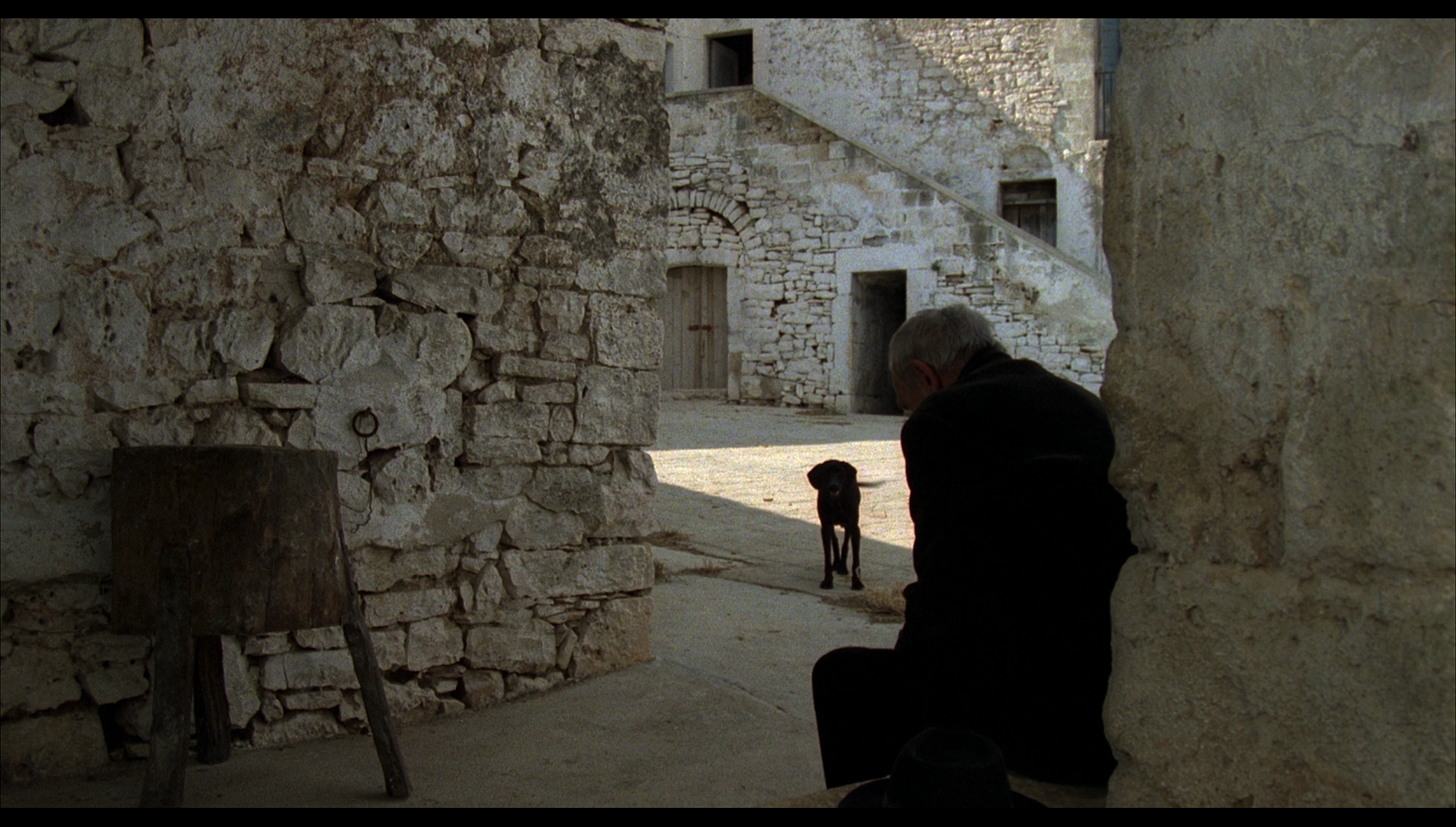 Tre fratelli (Three Brothers, Francesco Rosi, 1981) Tre fratelli (Three Brothers, Francesco Rosi, 1981)
Throughout much of his career, Francesco Rosi was associated with the cine-inchieste, investigative films that were explicitly political and explored social, historical and political issues in a manner that sometimes necessitated a semi-documentary aesthetic. In this sense, Rosi's work is often allied with the films of Elio Petri and Costa-Gavras. Some of the best examples of this approach within Rosi’s body of work are Salvatore Giuliano (1962), Le mani sulla città (Hands Over the City, 1963) and Il caso Mattei (The Mattei Affair, 1973). These films foregrounded the relationships between individuals and the institutions that govern their lives, often drawing parallels between ‘legitimate’ society – politics and corporations – and the underworld. His 1976 film Cadaveri eccellenti (Illustrious Corpses) was the last of Rosi’s cine-inchieste pictures, and with his next film, Cristo si è fermato a Eboli (Christ Stopped at Eboli, 1979; an adaptation of Carlo Levi’s novel), Rosi began to move in a slightly different direction. His subsequent films, including Tre fratelli (Three Brothers, 1981), were still socially-minded but in a more subtle and symbolic manner, gradually moving into the realm of magical realism with Cronaca di una morte annunciata (Chronicle of a Death Foretold, 1987), adapted from the novel by Gabriel Garcia Marquez. 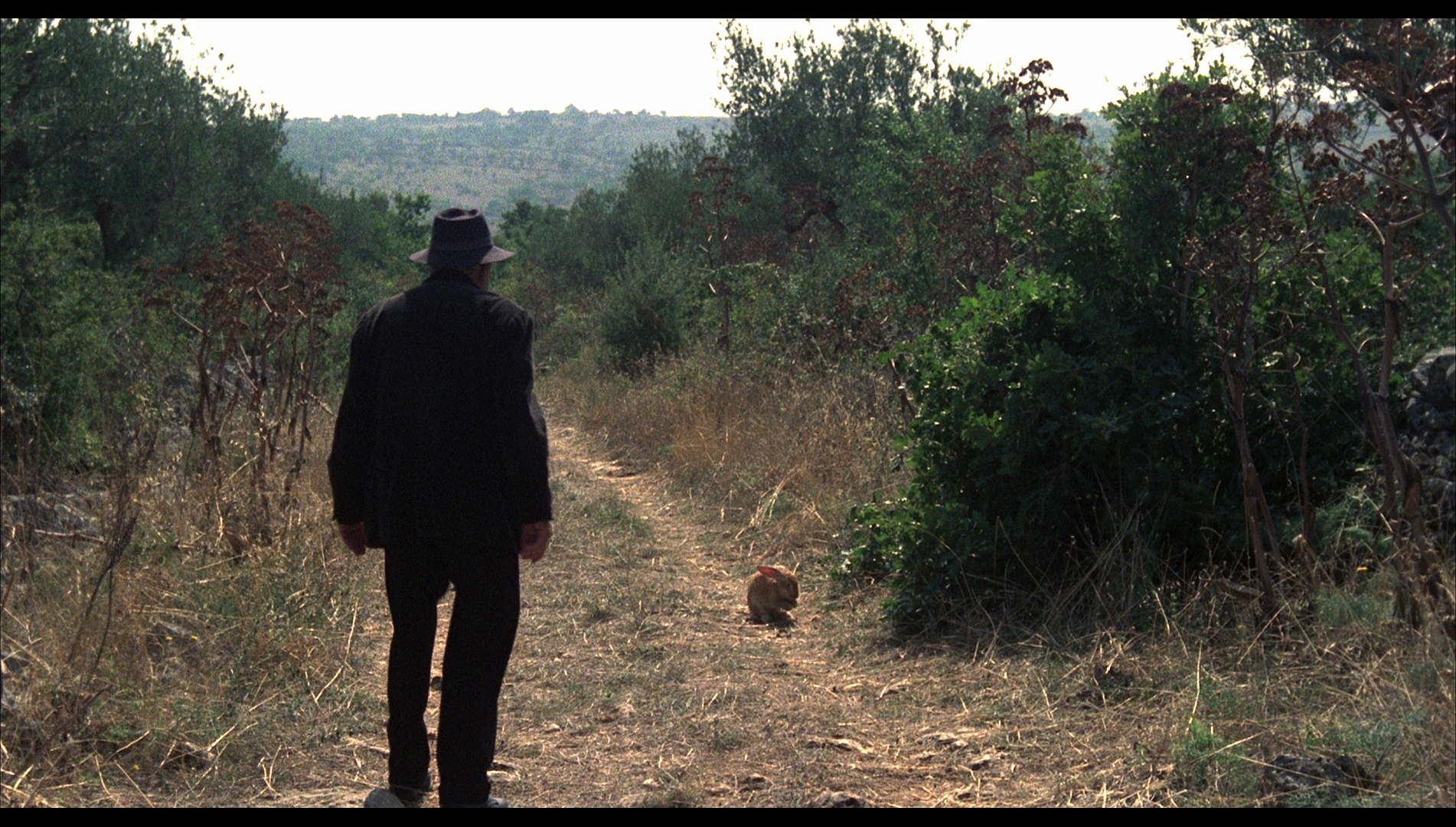 In Italy’s south, following the death of his wife Catarina, elderly farmer Donato (Charles Vanel) sends telegrams to his three sons informing them of the passing of their mother. The three sons live in different parts of Italy and move in very different walks of life. The oldest son, Raffaele (Philippe Noiret), works as a judge in Rome and has become involved in cases against members of paramilitary groups. It’s gradually revealed that Raffaele has had threats against his life made by these groups, and has seen friends and colleagues gunned down by their members. Raffaele has a wife (Andrea Ferreol) and a teenaged son (Cosimo Milone) who fear for his safety. The second son, Rocco (Vittorio Mezzogiorno), lives an austere life working at a corrections institute for young men in Naples, counseling and caring for the youths in his care in order to steer them away from crime and association with militant groups. The third son, Nicola (Michele Placido), works in a factory in Turin and has become involved in labour movements; Raffaele fears that Nicola’s attitudes legitimise the actions of leftist paramilitary groups. Nicola arrives with his six year old daughter Marta (Marta Zoffoli), having been estranged from his northern wife. Marta soon develops a warm relationship with her grandfather, exploring the farm with childish wonder and joy and sleeping next to Donato. Donato finds that the presence of Marta connects him to his deceased wife in some way, leading him to dream of their wedding and honeymoon. In Italy’s south, following the death of his wife Catarina, elderly farmer Donato (Charles Vanel) sends telegrams to his three sons informing them of the passing of their mother. The three sons live in different parts of Italy and move in very different walks of life. The oldest son, Raffaele (Philippe Noiret), works as a judge in Rome and has become involved in cases against members of paramilitary groups. It’s gradually revealed that Raffaele has had threats against his life made by these groups, and has seen friends and colleagues gunned down by their members. Raffaele has a wife (Andrea Ferreol) and a teenaged son (Cosimo Milone) who fear for his safety. The second son, Rocco (Vittorio Mezzogiorno), lives an austere life working at a corrections institute for young men in Naples, counseling and caring for the youths in his care in order to steer them away from crime and association with militant groups. The third son, Nicola (Michele Placido), works in a factory in Turin and has become involved in labour movements; Raffaele fears that Nicola’s attitudes legitimise the actions of leftist paramilitary groups. Nicola arrives with his six year old daughter Marta (Marta Zoffoli), having been estranged from his northern wife. Marta soon develops a warm relationship with her grandfather, exploring the farm with childish wonder and joy and sleeping next to Donato. Donato finds that the presence of Marta connects him to his deceased wife in some way, leading him to dream of their wedding and honeymoon.
Martha P Nochimson observes that in Three Brothers, Rosi ‘makes the family a template through which to view contemporary Italy’, linking Rosi’s picture to a group of Italian films that explored ‘Italy by displacement’, using ‘troubled family stories’ as a means of exploring social and political issues within Italian society (Nochimson, 2010: 192). This trend is arguably an ongoing filone within Italian cinema, and can be seen in films such as Nanni Moretti’s La stanza di figlio (The Son’s Room, 2001), which focuses on the trauma enacted to a family when their son dies in a tragic accident. 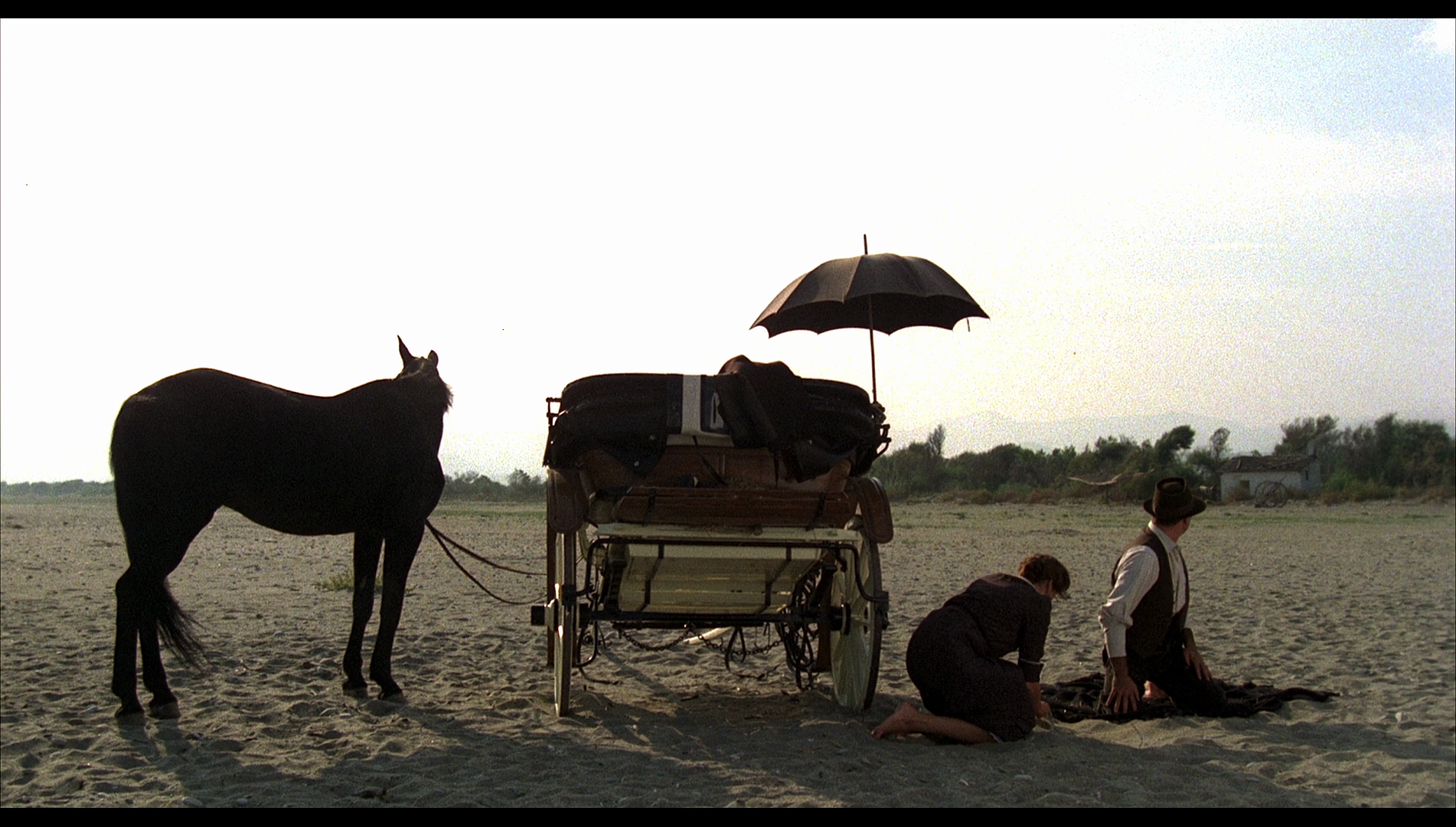 As noted above, with Christ Stops at Eboli Rosi’s films took a turn away from the semidocumentary approach that had characterised the pictures he made during the 1960s – such as Salvatore Giuliano, Hands Over the City and The Mattei Affair. The post-Christ Stops at Eboli films demonstrate a growing fascination with the techniques of magical realism, which would culminate in Rosi’s adaptation of Gabriel Garcia Marquez’ novel Chronicle of a Death Foretold. Three Brothers has some elements that could be associated with magical realism: notably, in the second half of the film, there are some moments in which dreams and memories overlap with the ‘real’ world. These moments are all the more startling for being placed in a film which is predominantly realistic in its approach to its material. At the start of the film, Donato is shown wandering through the fields. He spots a rabbit and tries to catch it. He’s interrupted by an elderly woman. They converse. The elderly woman waves to him and vanishes. The audience may be left uncertain as to whether the shocked Donato is suffering from dementia; later, it becomes apparent that the woman he saw in the field was a spectral image or memory of his wife. Much later in the film, after being shown leafing through a series of files and photographs showing judges and policemen who have been slain by paramilitary groups (and members of these groups themselves who have been killed by the police), Raffaele experiences what we presume to be an extended dream sequence – most likely based on memory – in which he witnesses the murder of a friend, a fellow judge, at the hands of a young man and woman on the streets of Rome. Shortly afterwards, Donato is shown in bed with Marta, and the film cuts to his dream of his wedding day – a day of dancing and joy at the farm where he currently resides – and then his honeymoon. In Donato’s dream of his honeymoon, his young bride (played by Simonetta Stefanelli) buries her feet in the sand, playing dreamily before realising she has lost her wedding ring. Donato helps her look for it in the sand; the couple are framed together, Donato’s young wife’s back to a wagon and Donato’s horse on the left hand side of the frame. It’s a strange, almost surreal image owing to the presence of the horse on the beach. Finally, Rocco experiences the film’s most strange and symbolic dream sequence, like a particularly bizarre dance number from a Hollywood musical has intruded on the drama. Rocco imagines guns littering the streets, the young men of his correctional institute trying desperately to sweep the streets clean before money begins falling from the skies. These dream sequences that punctuate the film’s narrative become increasingly abstract and symbolic as the picture moves towards it conclusion, with Rocco’s dream – the final such sequence of the film – making explicit the connections between youth, disillusionment, poverty and violence. As noted above, with Christ Stops at Eboli Rosi’s films took a turn away from the semidocumentary approach that had characterised the pictures he made during the 1960s – such as Salvatore Giuliano, Hands Over the City and The Mattei Affair. The post-Christ Stops at Eboli films demonstrate a growing fascination with the techniques of magical realism, which would culminate in Rosi’s adaptation of Gabriel Garcia Marquez’ novel Chronicle of a Death Foretold. Three Brothers has some elements that could be associated with magical realism: notably, in the second half of the film, there are some moments in which dreams and memories overlap with the ‘real’ world. These moments are all the more startling for being placed in a film which is predominantly realistic in its approach to its material. At the start of the film, Donato is shown wandering through the fields. He spots a rabbit and tries to catch it. He’s interrupted by an elderly woman. They converse. The elderly woman waves to him and vanishes. The audience may be left uncertain as to whether the shocked Donato is suffering from dementia; later, it becomes apparent that the woman he saw in the field was a spectral image or memory of his wife. Much later in the film, after being shown leafing through a series of files and photographs showing judges and policemen who have been slain by paramilitary groups (and members of these groups themselves who have been killed by the police), Raffaele experiences what we presume to be an extended dream sequence – most likely based on memory – in which he witnesses the murder of a friend, a fellow judge, at the hands of a young man and woman on the streets of Rome. Shortly afterwards, Donato is shown in bed with Marta, and the film cuts to his dream of his wedding day – a day of dancing and joy at the farm where he currently resides – and then his honeymoon. In Donato’s dream of his honeymoon, his young bride (played by Simonetta Stefanelli) buries her feet in the sand, playing dreamily before realising she has lost her wedding ring. Donato helps her look for it in the sand; the couple are framed together, Donato’s young wife’s back to a wagon and Donato’s horse on the left hand side of the frame. It’s a strange, almost surreal image owing to the presence of the horse on the beach. Finally, Rocco experiences the film’s most strange and symbolic dream sequence, like a particularly bizarre dance number from a Hollywood musical has intruded on the drama. Rocco imagines guns littering the streets, the young men of his correctional institute trying desperately to sweep the streets clean before money begins falling from the skies. These dream sequences that punctuate the film’s narrative become increasingly abstract and symbolic as the picture moves towards it conclusion, with Rocco’s dream – the final such sequence of the film – making explicit the connections between youth, disillusionment, poverty and violence.
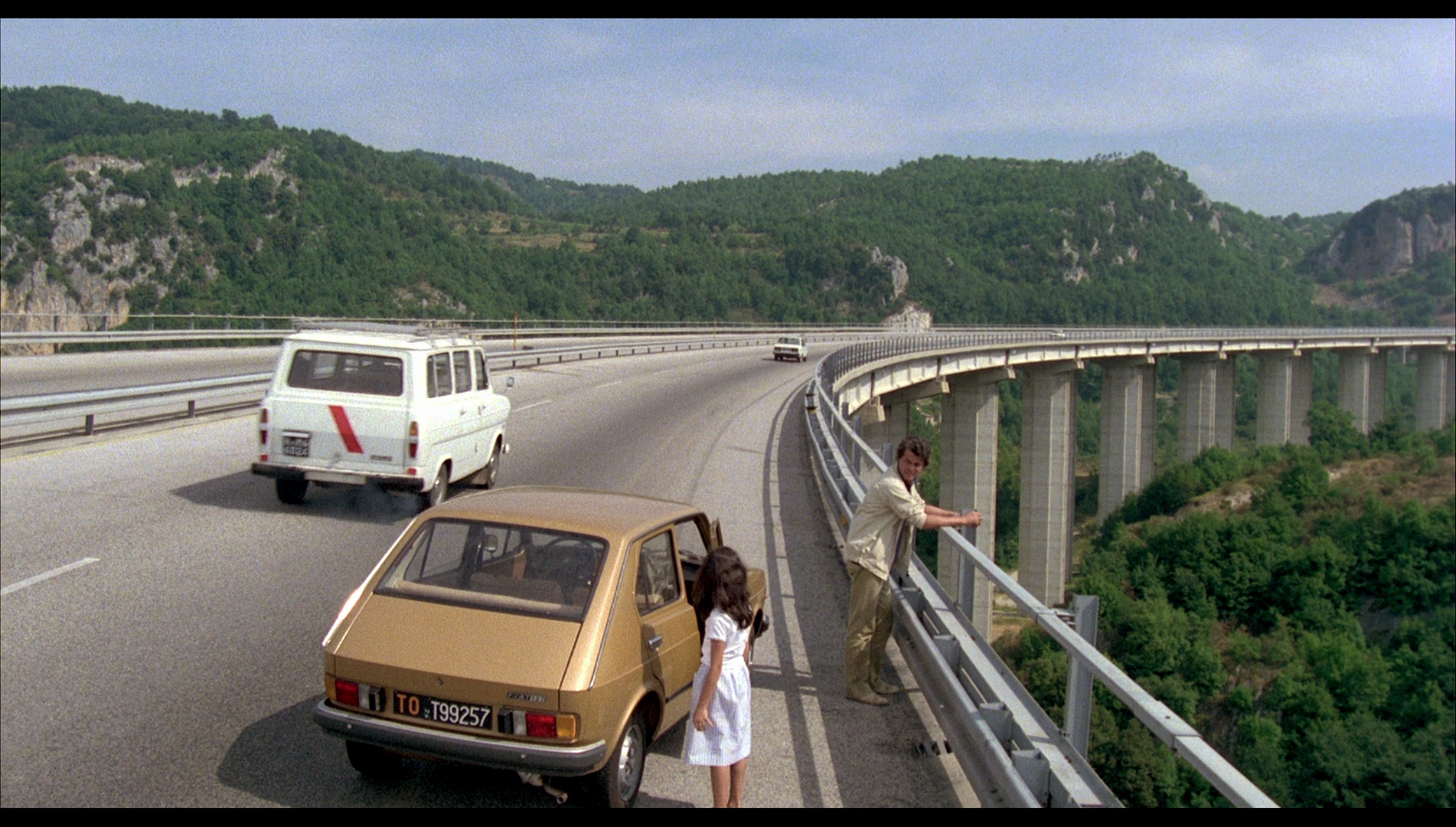 Based on the 1935 short story ‘The Third Son’ by Russian author Andrei Platonov (continuing the run of literary adaptations that seemed to form the core of Rosi’s work post-Christ Stopped at Eboli), the narrative of Three Brothers is simple and offers an opportunity for the three brothers, who together with their father represent different values, conflict and regions of Italy, to come together at their family farm and engage in a series of dialogues that highlight their seemingly irreconcilable differences. Platonov’s short story is very similar in this regard: beginning with the death of an elderly woman and her husband sending telegrams to the couple’s six children, the story focuses on the coming together of the six sons and their father. Like the three brothers in Rosi’s film adaptation, the six sons in Platonov’s story have moved into different areas of the country and taken up various types of employment: two are commanders in the navy, one works in theatre, another is an agriculturalist, yet another works at an airplane factory, and the final son (the titular ‘third son’, in terms of age) is a physicist and communist who brings with him his six year old daughter. Based on the 1935 short story ‘The Third Son’ by Russian author Andrei Platonov (continuing the run of literary adaptations that seemed to form the core of Rosi’s work post-Christ Stopped at Eboli), the narrative of Three Brothers is simple and offers an opportunity for the three brothers, who together with their father represent different values, conflict and regions of Italy, to come together at their family farm and engage in a series of dialogues that highlight their seemingly irreconcilable differences. Platonov’s short story is very similar in this regard: beginning with the death of an elderly woman and her husband sending telegrams to the couple’s six children, the story focuses on the coming together of the six sons and their father. Like the three brothers in Rosi’s film adaptation, the six sons in Platonov’s story have moved into different areas of the country and taken up various types of employment: two are commanders in the navy, one works in theatre, another is an agriculturalist, yet another works at an airplane factory, and the final son (the titular ‘third son’, in terms of age) is a physicist and communist who brings with him his six year old daughter.
Naturally, Three Brothers expands upon the sketchy narrative of Platonov’s very short story. However, Rosi’s film also reduces the number of brothers to three, their professions allowing the exploration of different attitudes within Italian society towards militancy, deviance and the activities of paramilitary groups like the Brigate Rosse (Red Brigades). Platonov’s story, as the title might suggest, is predominantly about the ‘third son’; the son who brings with him a young daughter who has never seen her grandfather before, and who shares a bed with her grandfather, her presence reminding him of his departed wife. Likewise, though the change in title suggests it focuses on the three brothers equally, Three Brothers casts its strongest light on Nicola – his spoiled marriage, and how his militancy is perceived by his two brothers and his sense of alienation from his home – and his daughter Marta’s relationship with her grandfather and her own father’s childhood home. 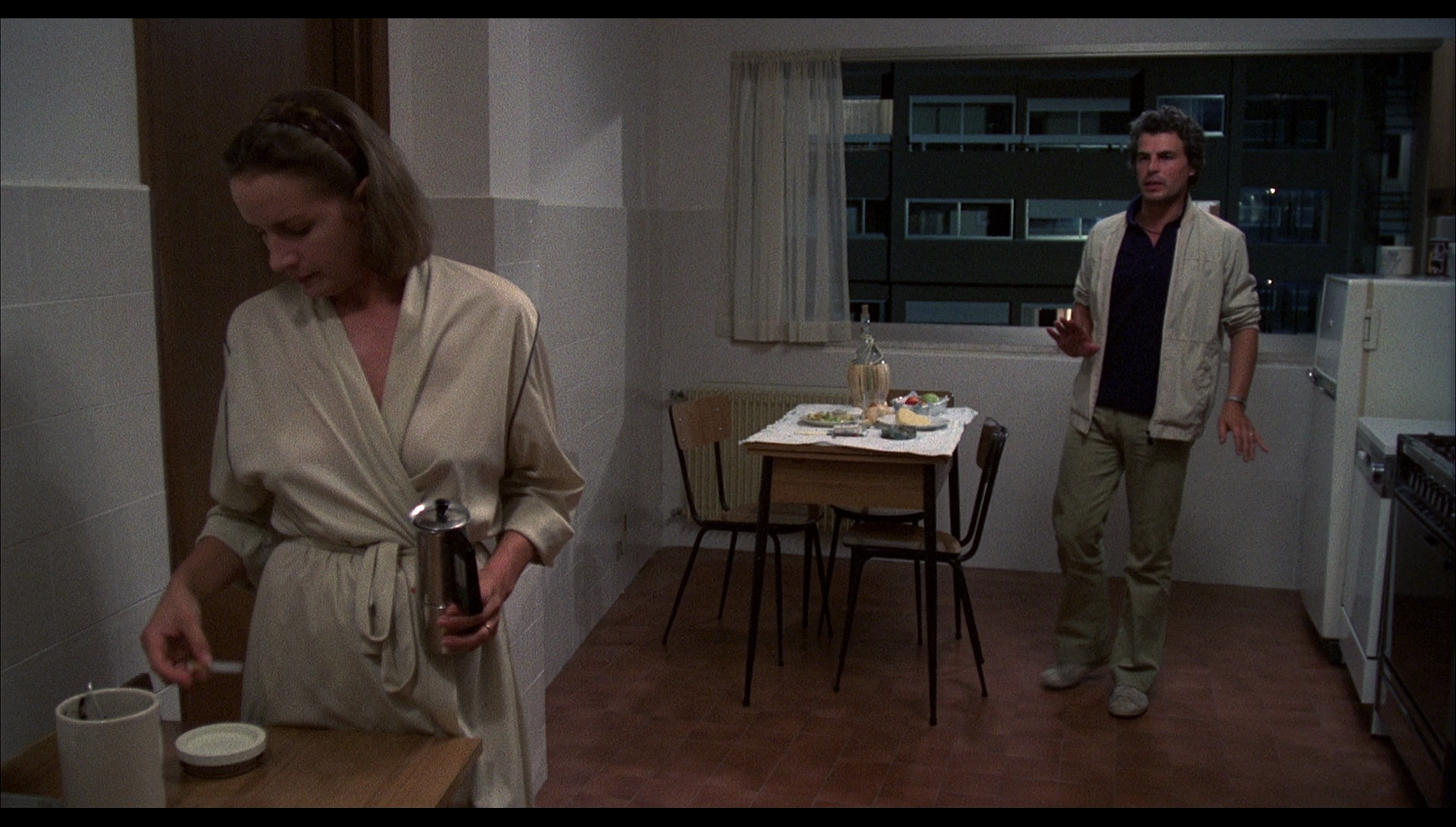 It’s perhaps important to remember that when Tre fratelli was made, the anni di piombo (‘years of lead’) were still raging, with fourteen murders having been carried out by the Brigate Rosse and similar paramilitary groups during the previous year, 1980, and the bombing of the main train station in Bologna (organised predominantly by the neo-fascist group Nuclei Armati Rivoluzionari) in August of 1980 having killed eighty-five people. The film returns time and time again to the issue of militancy, the actions of paramilitary groups and the ‘problem’ of how to steer young people away from them. In an extended flashback/dream sequence from Raffaele’s perspective, we see Raffaele talking with one of his colleagues, a fellow judge, who is gunned down brutally on public transport by two members of such a group: the killers are both young, suggesting how attractive the ideologies of such groups are/were to the youth of Italy, and one of them is a young man whilst the other is a young woman – highlighting the extent to which the activities of such groups weren’t restricted to the male gender. Nicola offers the film’s viewer insight into such groups: alienated and isolated by his movement north, from his family’s farm in the south of Italy to Turin, Nicola is discontent – poorly paid, apparently, and unhappy in his employment at the factory owing to the working conditions he experiences. He has a child, Marta, with his wife, but his relationship with his wife has dissolved owing to a failure to ‘connect’ between the couple: Nicola suggests to Raffaele that his (Nicola’s) wife regards him with prejudice because he’s a rural southerner, whilst Nicola looks with scorn upon his wife owing to his own prejudice against northerners. Transient, Nicola lives in a hotel following his separation from his wife. Where Rocco demonstrates utter restraint in his austere life, to the point of rarely expressing a personal opinion or displaying any strong emotion, Nicola is quick to anger and perhaps too swift to express his feelings about any particular issue. It’s perhaps important to remember that when Tre fratelli was made, the anni di piombo (‘years of lead’) were still raging, with fourteen murders having been carried out by the Brigate Rosse and similar paramilitary groups during the previous year, 1980, and the bombing of the main train station in Bologna (organised predominantly by the neo-fascist group Nuclei Armati Rivoluzionari) in August of 1980 having killed eighty-five people. The film returns time and time again to the issue of militancy, the actions of paramilitary groups and the ‘problem’ of how to steer young people away from them. In an extended flashback/dream sequence from Raffaele’s perspective, we see Raffaele talking with one of his colleagues, a fellow judge, who is gunned down brutally on public transport by two members of such a group: the killers are both young, suggesting how attractive the ideologies of such groups are/were to the youth of Italy, and one of them is a young man whilst the other is a young woman – highlighting the extent to which the activities of such groups weren’t restricted to the male gender. Nicola offers the film’s viewer insight into such groups: alienated and isolated by his movement north, from his family’s farm in the south of Italy to Turin, Nicola is discontent – poorly paid, apparently, and unhappy in his employment at the factory owing to the working conditions he experiences. He has a child, Marta, with his wife, but his relationship with his wife has dissolved owing to a failure to ‘connect’ between the couple: Nicola suggests to Raffaele that his (Nicola’s) wife regards him with prejudice because he’s a rural southerner, whilst Nicola looks with scorn upon his wife owing to his own prejudice against northerners. Transient, Nicola lives in a hotel following his separation from his wife. Where Rocco demonstrates utter restraint in his austere life, to the point of rarely expressing a personal opinion or displaying any strong emotion, Nicola is quick to anger and perhaps too swift to express his feelings about any particular issue.
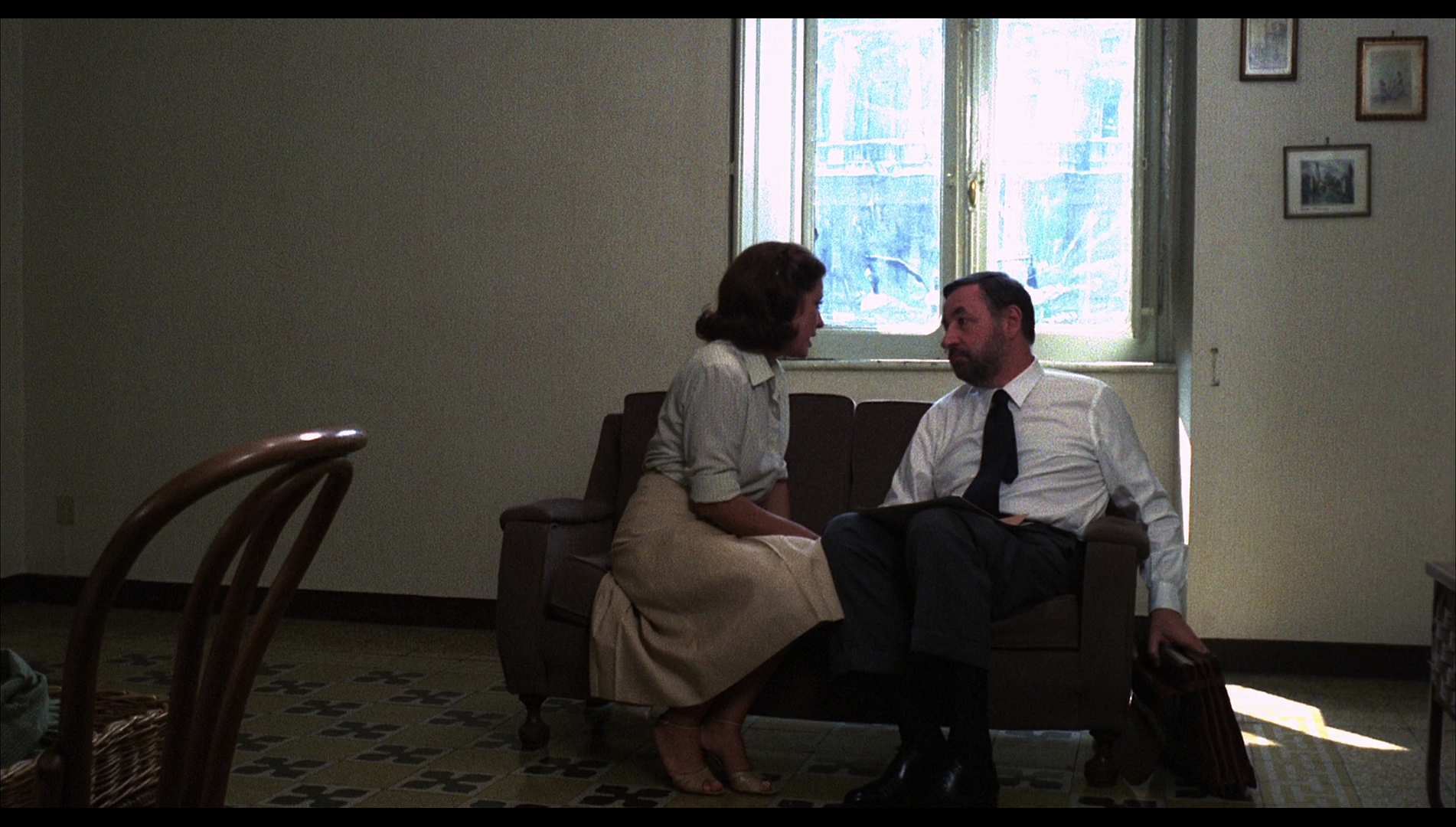 The film doesn’t offer any easy solutions to the ‘problem’ of the radicalisation of Italy’s youth and the alienation they experience. Various positions are sketched and elaborated within scenes of dialogue between, usually, two of the brothers and sometimes between one of the brothers and other characters. In the scenes that introduce Rocco, he is shown caring for the young men in his institution, despite the trappings of poverty that surround them. A policeman arrives at the institution and speaks with Rocco, telling Rocco that some of the boys have been sneaking out at night and stealing. A downtrodden Rocco listens as the policeman threatens him: ‘Collaborate’, the policeman commands, ‘Give us names [….] Don’t waste time or we’ll take over’. Later, Rocco discusses his work with Raffaele whilst looking at a UNICEF report on child welfare; the distressing images of child poverty from around the world are shown for the film’s audience. In reference to the young men in his care, Rocco tells Raffaele explicitly that ‘Once they’re in the prison, that’s the end’: Rocco’s struggle is in trying to persuade young men in danger of falling into a criminal lifestyle to come to his institution for help. Raffaele’s answer to this is deeply unsympathetic: ‘They should never have been born’, he asserts. ‘But they were’, Rocco reminds him, ‘Each one’s an extra pair of hands at home. We’re breeding scavengers’, he says as images of poverty-stricken children from around the world are shown onscreen, ‘not just in Naples but in Africa, Asia and South America’. Rocco believes that the answer lies in persuading people to make sacrifices in order to improve the lot of the people at the bottom of the social ladder, but this requires ‘chang[ing] people’s hearts’ – which, the weary tone in his voice suggests, is a near-impossible task. The film doesn’t offer any easy solutions to the ‘problem’ of the radicalisation of Italy’s youth and the alienation they experience. Various positions are sketched and elaborated within scenes of dialogue between, usually, two of the brothers and sometimes between one of the brothers and other characters. In the scenes that introduce Rocco, he is shown caring for the young men in his institution, despite the trappings of poverty that surround them. A policeman arrives at the institution and speaks with Rocco, telling Rocco that some of the boys have been sneaking out at night and stealing. A downtrodden Rocco listens as the policeman threatens him: ‘Collaborate’, the policeman commands, ‘Give us names [….] Don’t waste time or we’ll take over’. Later, Rocco discusses his work with Raffaele whilst looking at a UNICEF report on child welfare; the distressing images of child poverty from around the world are shown for the film’s audience. In reference to the young men in his care, Rocco tells Raffaele explicitly that ‘Once they’re in the prison, that’s the end’: Rocco’s struggle is in trying to persuade young men in danger of falling into a criminal lifestyle to come to his institution for help. Raffaele’s answer to this is deeply unsympathetic: ‘They should never have been born’, he asserts. ‘But they were’, Rocco reminds him, ‘Each one’s an extra pair of hands at home. We’re breeding scavengers’, he says as images of poverty-stricken children from around the world are shown onscreen, ‘not just in Naples but in Africa, Asia and South America’. Rocco believes that the answer lies in persuading people to make sacrifices in order to improve the lot of the people at the bottom of the social ladder, but this requires ‘chang[ing] people’s hearts’ – which, the weary tone in his voice suggests, is a near-impossible task.
Raffaele deals with this problem at the other end of the system, convicting and sentencing offenders. When the film opens, he has taken on a new case which has led to him fearing for his life. Although he tries to hide this from his wife, she sense his anxiety, begging him ‘don’t accept that new assignment [….] I’m saying this because danger seems to excite you. I’m not saying you enjoy the tension, but it intoxicates you’. ‘No, it frightens me’, Raffaele offers. ‘Fear can be a drug’, his wife reminds him before suggesting that the decisions Raffaele makes seem intent on splitting the family geographically, taking Raffaele to different places to his wife and son: ‘You move us like pieces on a chessboard without realising it’, she says. 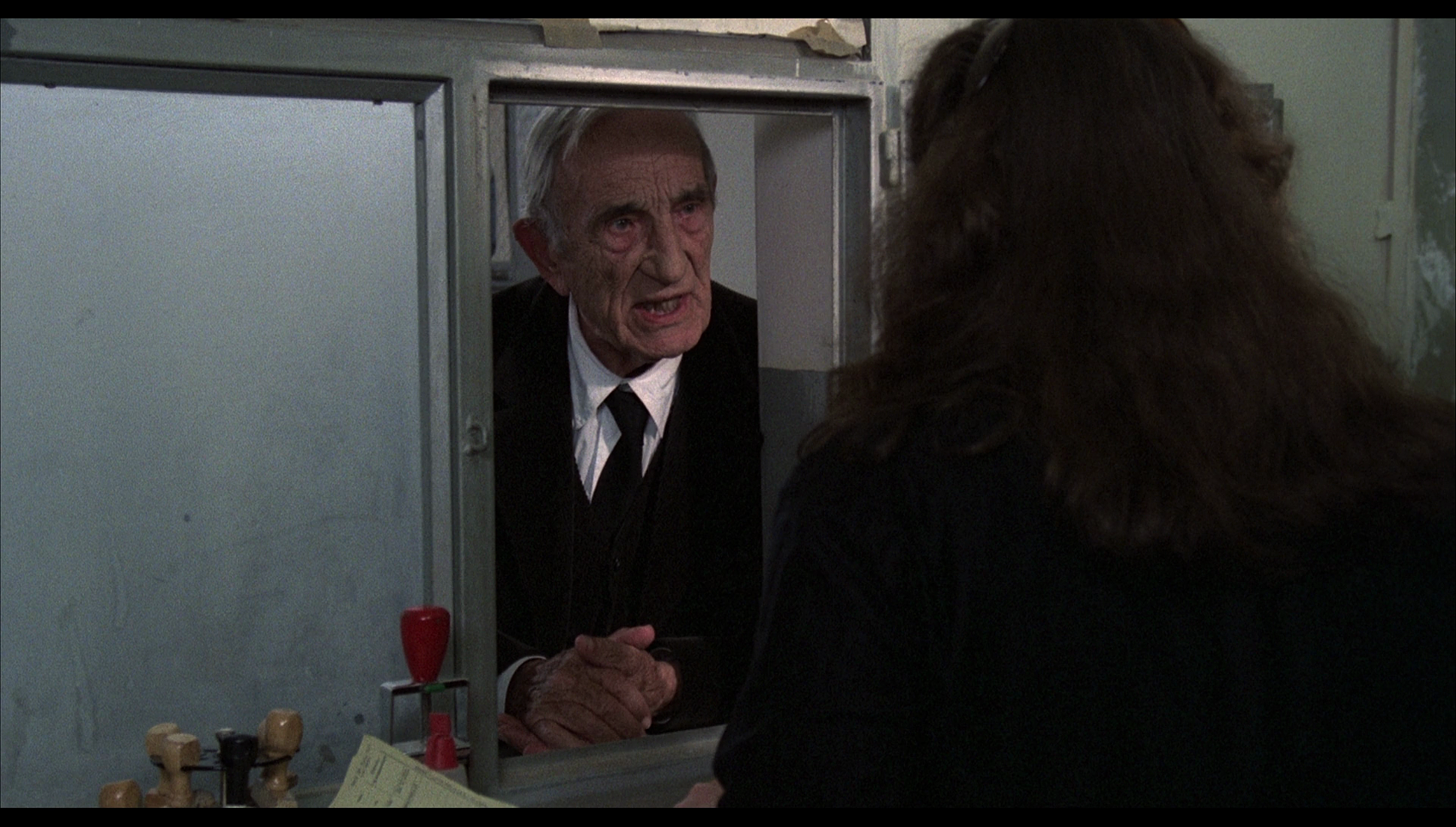 Between these two men, ideologically at least, is the ‘third brother’ of the title of Platonov’s short story: Nicola, who has moved from his family home to Turin, working in factories there and marrying a woman (Marta’s mother) from whom he is now alienated. Nicola describes his wife as ‘a typical northerner’. Nicola has become involved in an unspecificed labour movement which is responsible for various strikes, but which Raffaele suggests may be complicit in the violence committed by more militant groups. Nicola tells Raffaele that when he moved to Turin it ‘was scary then […] especially for us southerners’. Life in Turin was difficult, even after Nicola found a job at a factory: ‘It was hell. The poisonous fumes, the noise, then strikes for better conditions’. Nicola says that he ‘didn’t shy away from showdowns with he bosses’, recognising that for Raffaele ‘that’s violence, isn’t it?’ However, Nicola suggests that he has experienced another form of violence: ‘the violence of the assembly line. You know why they want to get rid of me?’, Nicola asks, ‘Because I question things. I don’t give in to them [the bosses] and I cause trouble. But I’ve never believed in shooting people to bring about change’. Between these two men, ideologically at least, is the ‘third brother’ of the title of Platonov’s short story: Nicola, who has moved from his family home to Turin, working in factories there and marrying a woman (Marta’s mother) from whom he is now alienated. Nicola describes his wife as ‘a typical northerner’. Nicola has become involved in an unspecificed labour movement which is responsible for various strikes, but which Raffaele suggests may be complicit in the violence committed by more militant groups. Nicola tells Raffaele that when he moved to Turin it ‘was scary then […] especially for us southerners’. Life in Turin was difficult, even after Nicola found a job at a factory: ‘It was hell. The poisonous fumes, the noise, then strikes for better conditions’. Nicola says that he ‘didn’t shy away from showdowns with he bosses’, recognising that for Raffaele ‘that’s violence, isn’t it?’ However, Nicola suggests that he has experienced another form of violence: ‘the violence of the assembly line. You know why they want to get rid of me?’, Nicola asks, ‘Because I question things. I don’t give in to them [the bosses] and I cause trouble. But I’ve never believed in shooting people to bring about change’.
Raffaele admits that he finds it difficult to empathise with Nicola: ‘There are twenty years between us and we’ve lost touch with one another’, Raffaele admits, ‘I have trouble understanding what you’ve become. I believe everything you say. But I also believe if they’re threatening to fire you, they must have a reason [….] If you theorise refusal of work and put it into practise […] you must accept the consequences’. ‘The consequences are improved conditions and less unemployment’, Nicola suggests, ‘Refusal of work isn’t absenteeism or throwing a “sickie”’. ‘Utopias have always created misfits’, Raffaele suggests matter-of-factly, ‘It’s a poison that attacks budding shoots’. Raffaele’s words are given irony as Rosi cuts away to Nicola’s daughter Marta, who is exploring Donato’s farm buildings and house with childish joy: Donato’s home, which represents the past from which Donato’s sons have separated themselves, is a place of pleasure for Marta – the utopia of this particular ‘budding shoot’. The three brothers' distance from the past seems to be represented in a sequence in which Raffaele visits his childhood nanny, Filomena, and gazes at the fig tree in her garden. ‘Was it always so small?’, Raffaele asks, in reference to the fig tree. ‘No, it’s you who has grown’, Filomena tells him. Likewise, visiting his estranged wife Nicola tells her that ‘I suddenly realised my village was no longer a part of me, and I was no longer a part of it [….] An emigrant’s real tragedy is losing his identity. He thinks he’ll be happy when he goes home. But he isn’t, so he heads back to the city, to Germany or America, and feels homesick’. In returning to their family’s farm, from which they have been estranged by the paths they have chosen in life, Peter E Bondanella suggests that the three brothers come to recognise within themselves a ‘nostalgia for the peasant culture of another, less complicated era’ that causes them ‘to reflect upon their lives’ (Bondanella, 2009: 333). This realisation, however, seems to be represented through Marta and her fascination firstly with Donato’s home, and secondly with Donato himself: Marta gradually spends more time with Donato than with Nicola, taking pleasure in her newfound relationship with her grandfather. 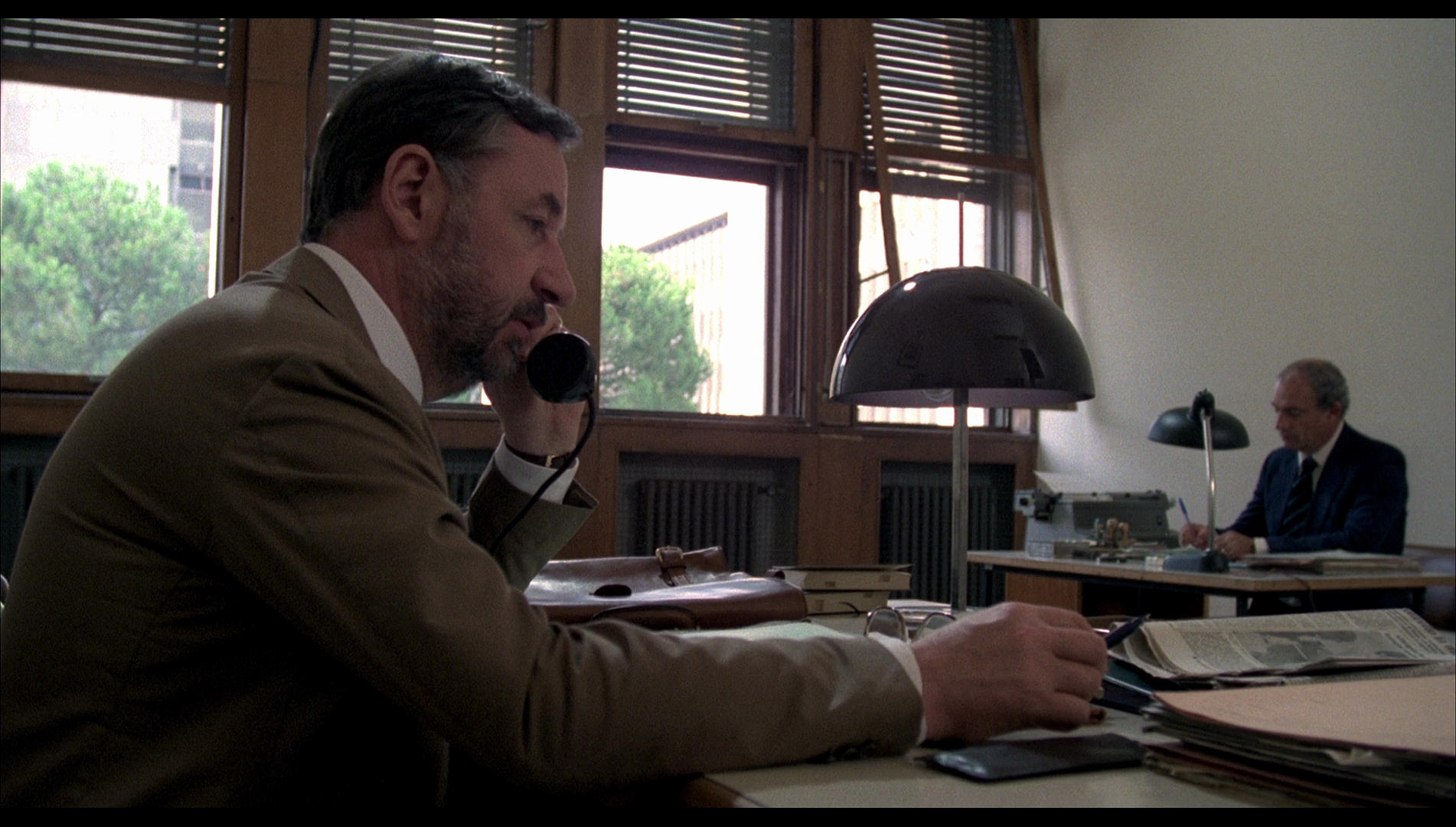 Meanwhile, Raffaele wanders into the nearby village and becomes engaged in a conversation about criminality. Aware that Raffaele is now a judge in Rome, some of the locals question him about issues of ethics and responsibility. ‘Must witnesses talk or not?’, one of the local men asks Raffaele, in reference to examples of crimes committed by paramilitary groups. One of the other men in the group cites a recent case involving a teenager who identified a terrorist but was too afraid to leave her home for fear of reprisals. ‘Her family’s ruined’, he says, ‘Why would I testify?’ ‘He’s right. Being a hero is a thing of the past’, another man adds. Raffaele’s answer is to suggest that the media, the police and the judiciary should do more to protect the identities of witnesses in such cases. ‘They’re full of spies’, one of the men says, in reference to these three institutions. If more people spoke out as witnesses, Raffaele reasons, those witnesses would be safer: ‘You can’t kill three hundred people’, he suggests, adding that ‘I know it’s not easy, because terror lives up to its name and replaces persuasion with fear. But societies can’t be founded on fear. Fear’s the exception to the rule. The rule must be faith. How can we live otherwise?’ Meanwhile, Raffaele wanders into the nearby village and becomes engaged in a conversation about criminality. Aware that Raffaele is now a judge in Rome, some of the locals question him about issues of ethics and responsibility. ‘Must witnesses talk or not?’, one of the local men asks Raffaele, in reference to examples of crimes committed by paramilitary groups. One of the other men in the group cites a recent case involving a teenager who identified a terrorist but was too afraid to leave her home for fear of reprisals. ‘Her family’s ruined’, he says, ‘Why would I testify?’ ‘He’s right. Being a hero is a thing of the past’, another man adds. Raffaele’s answer is to suggest that the media, the police and the judiciary should do more to protect the identities of witnesses in such cases. ‘They’re full of spies’, one of the men says, in reference to these three institutions. If more people spoke out as witnesses, Raffaele reasons, those witnesses would be safer: ‘You can’t kill three hundred people’, he suggests, adding that ‘I know it’s not easy, because terror lives up to its name and replaces persuasion with fear. But societies can’t be founded on fear. Fear’s the exception to the rule. The rule must be faith. How can we live otherwise?’
Puncturing any sense of nostalgia, one of Raffaele’s former friends, now a schoolteacher, reminds Raffaele that Italy has always been a land of ‘brigands and cut-throats, like in I promessi sposi [Allesandro Mazoni’s 1827 novel The Betrothed] […] Nowadays in Italy, just like in the past, there’s no dialogue between institutions and the people. There’s no union. No proper relationships’. ‘All very true’, Raffaele suggests, ‘But there’s no hope in your words and we have made some progress. Unfortunately, people believe they have an inalienable right to do what they do. On the one hand, there’s the obsession with wealth and becoming rich overnight. And on the other, there’s the foolish desire to change everything overnight. And this deep contempt for human life’. Following this conversation, Raffaele returns to his father’s house and tells Nicola that ‘violence in the factory must come to an end’, suggesting that militants like Nicola accept the killing of innocents – even if they are not complicit in it. They rail against the state ‘but you demand everything from it’, Raffaele asserts: ‘Your struggle mustn’t threatened democracy and liberty. If democracy goes, everything goes with it, including the possibility of a better world’. Raffaele continues by declaring ‘I risk my life every day in order to practise my profession, which is administering justice, not being a hero’. 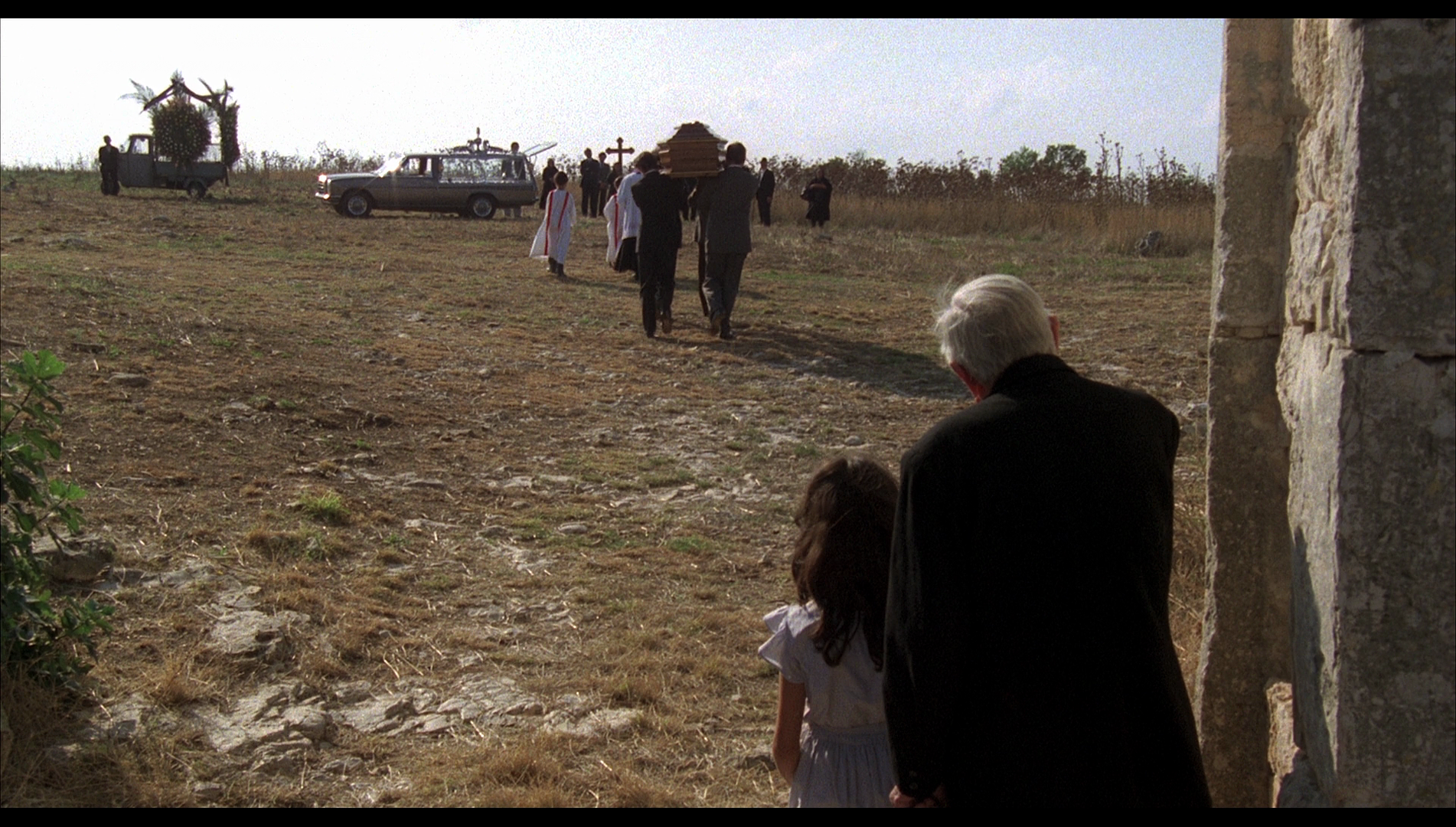 Pierre Sorlin has suggested that ultimately, at the end of Three Brothers Raffaele, Nicola and Rocco are forced to admit that ‘however fond they are of each other, […] they are miles apart in their manner of making sense of the world’ (Sorlin, 1996: 151). Certainly, near the end of the film, on the morning of their mother’s funeral, the three brothers awaken in the farmhouse. Rocco is the first to awaken, and he goes to the kitchen to make coffee. He looks out of the window and sees Raffaele and Nicola in the courtyard. All three brothers begin to sob heavily, each seated a strong distance from one another – united in their grief at the passing of their mother but disconnected from one another and either unable or unwilling to offer support to their brothers. It’s an interesting scene which leaves the viewer pondering the question of whether the experience will bring together these three brothers. The answer is that it probably will not. As the funeral procession leaves the farm, however, Donato is shown framed with his granddaughter: the experience may not have helped to bridge the differences between the brothers, but it has instead brought together grandfather and child, suggesting a connection between Italy’s past and the present and offering a glimmer of the hope that Raffaele suggests is so integral to existence. Pierre Sorlin has suggested that ultimately, at the end of Three Brothers Raffaele, Nicola and Rocco are forced to admit that ‘however fond they are of each other, […] they are miles apart in their manner of making sense of the world’ (Sorlin, 1996: 151). Certainly, near the end of the film, on the morning of their mother’s funeral, the three brothers awaken in the farmhouse. Rocco is the first to awaken, and he goes to the kitchen to make coffee. He looks out of the window and sees Raffaele and Nicola in the courtyard. All three brothers begin to sob heavily, each seated a strong distance from one another – united in their grief at the passing of their mother but disconnected from one another and either unable or unwilling to offer support to their brothers. It’s an interesting scene which leaves the viewer pondering the question of whether the experience will bring together these three brothers. The answer is that it probably will not. As the funeral procession leaves the farm, however, Donato is shown framed with his granddaughter: the experience may not have helped to bridge the differences between the brothers, but it has instead brought together grandfather and child, suggesting a connection between Italy’s past and the present and offering a glimmer of the hope that Raffaele suggests is so integral to existence.
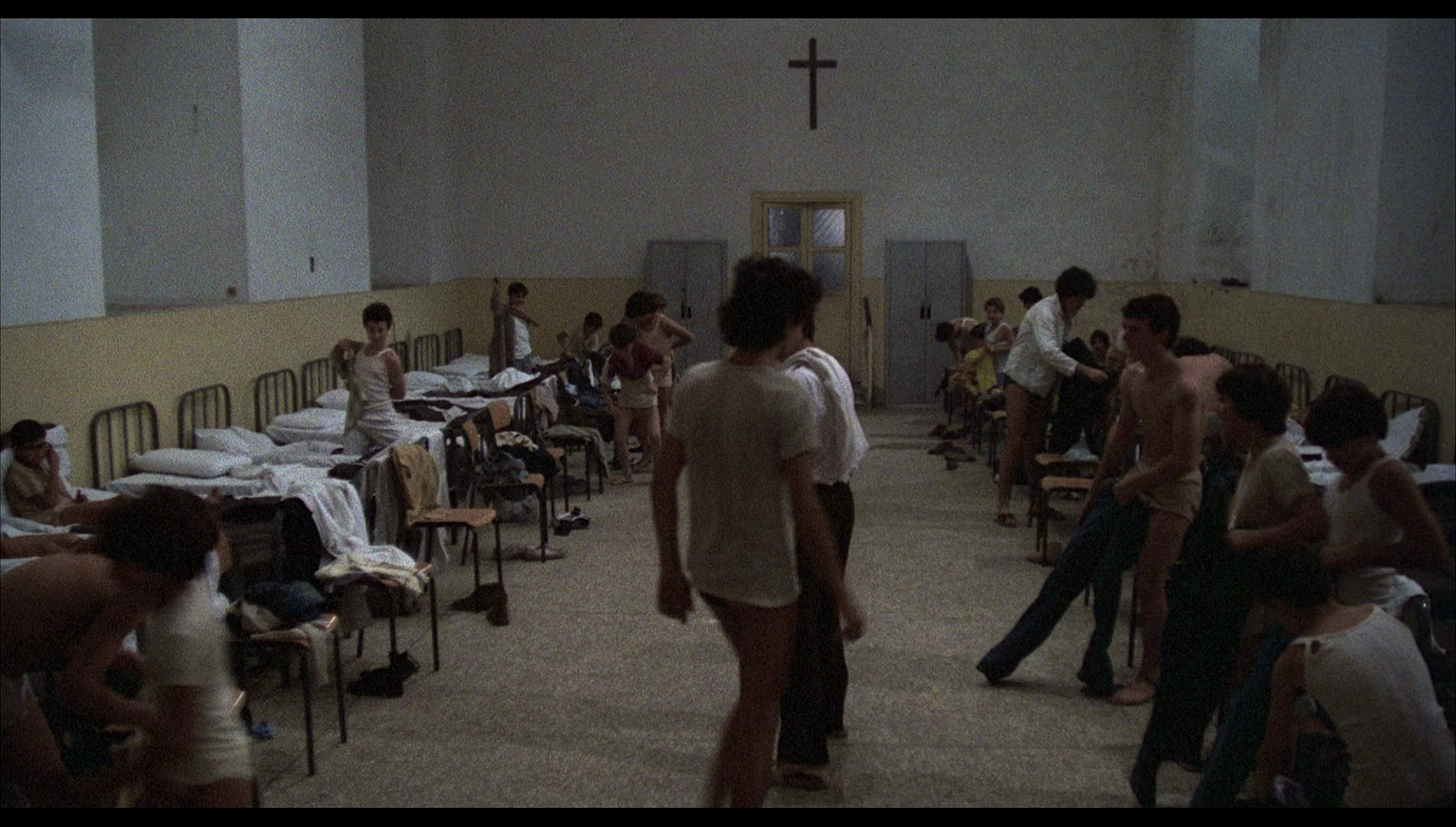 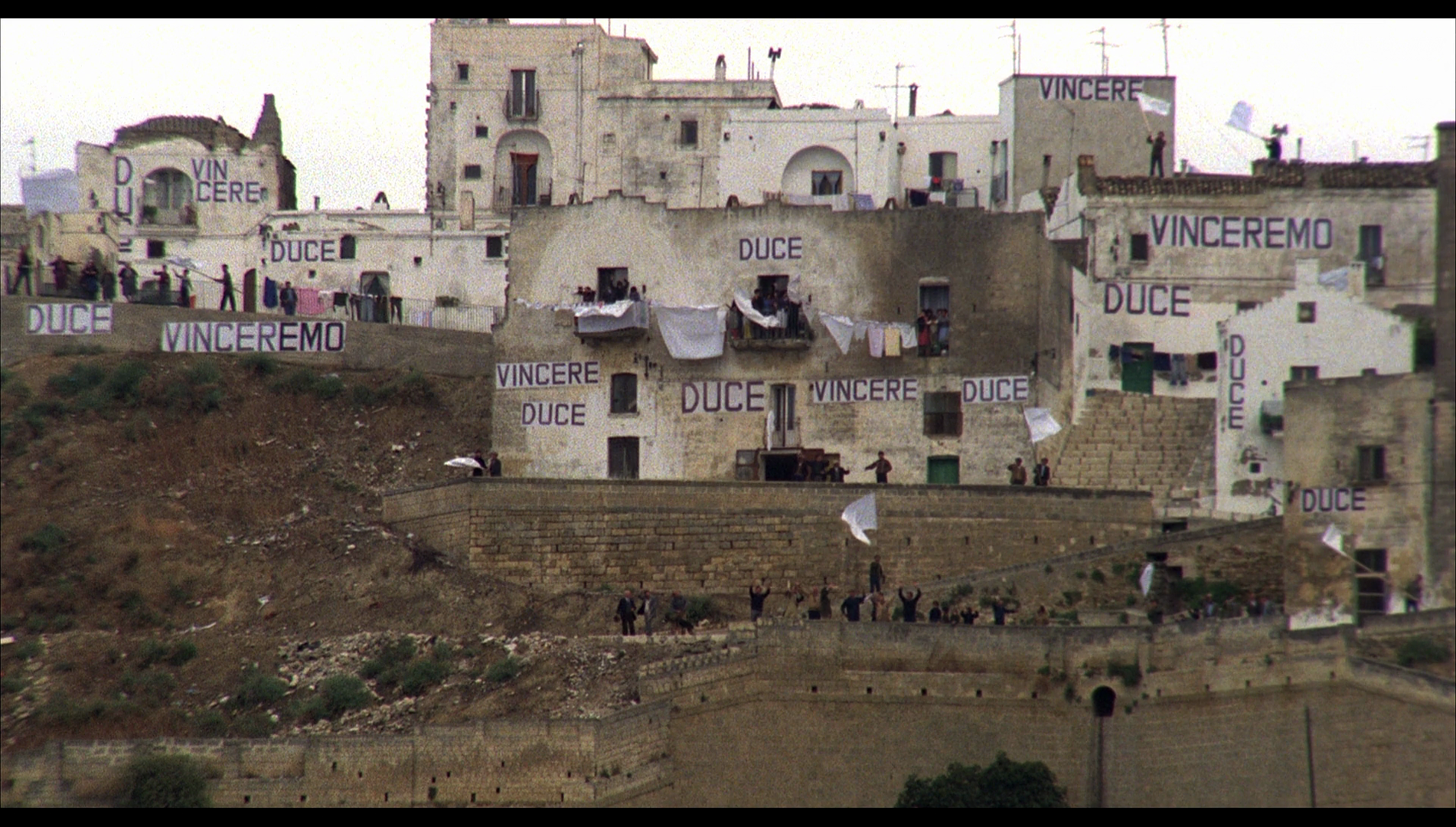 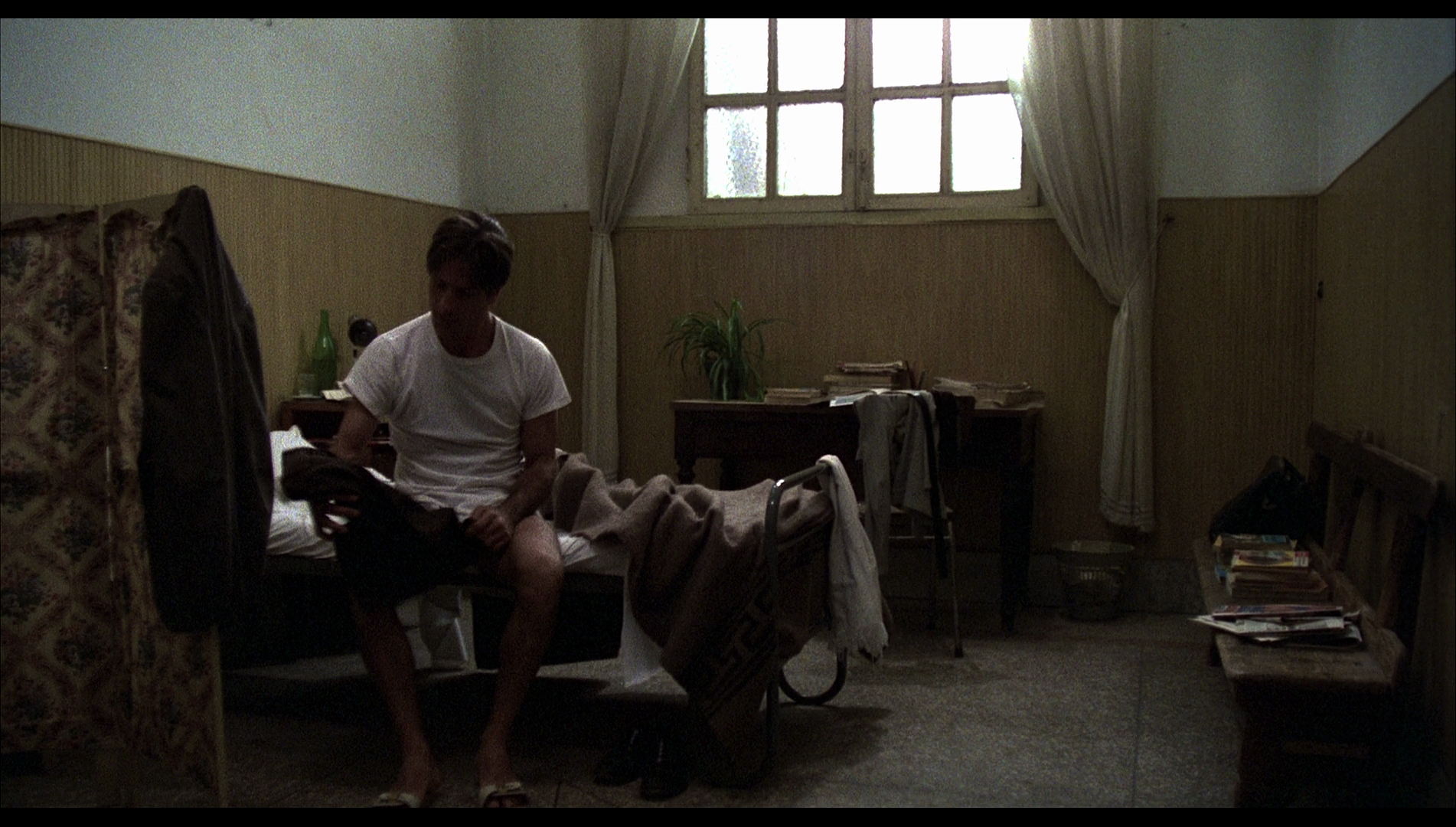
Video
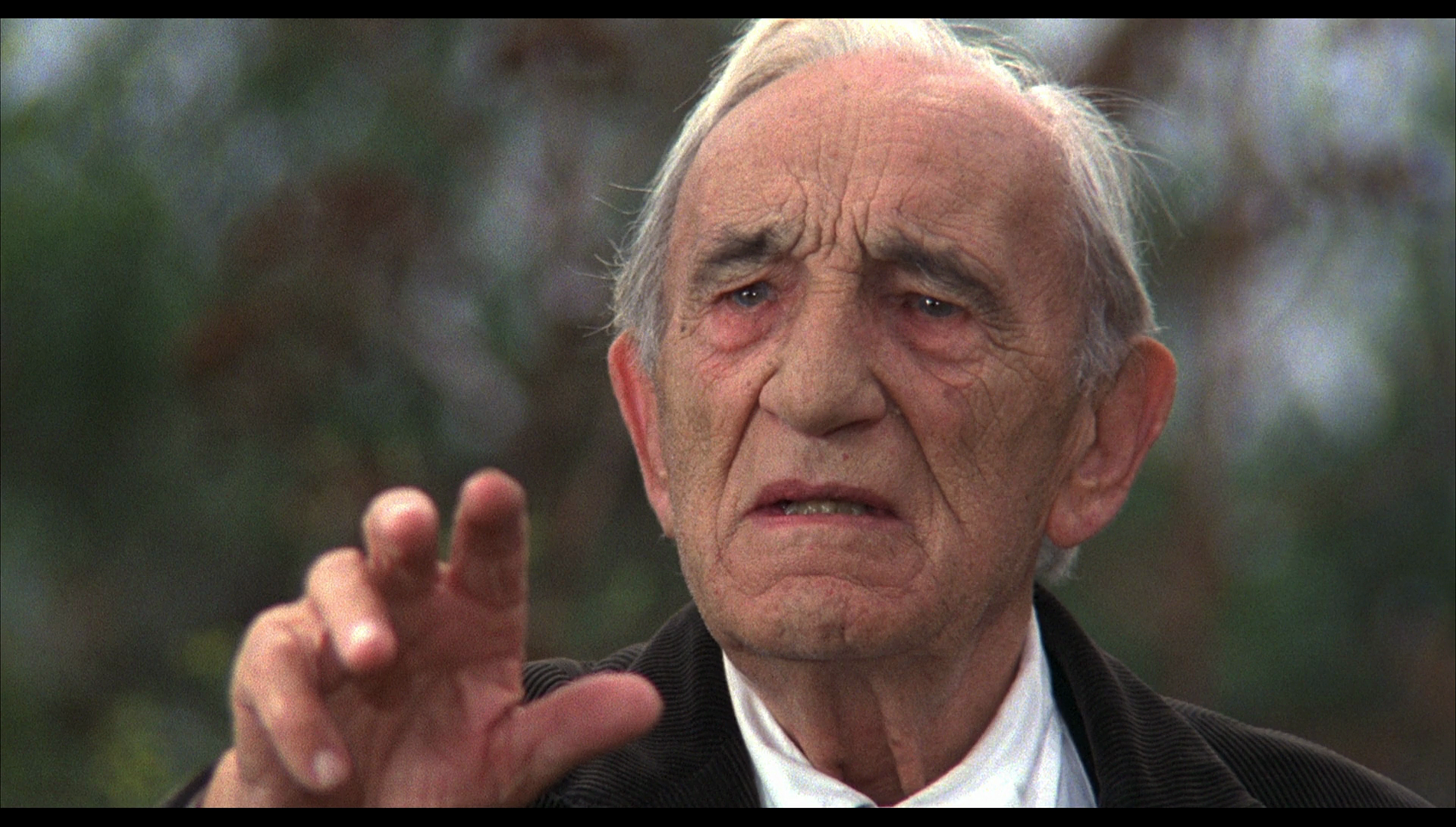 The film takes up approximately 30Gb of space on its disc, and the 1080p presentation uses the AVC codec. Three Brothers is presented in its original aspect ratio of 1.85:1. Based on a new 2k restoration, the presentation features a very impressive level of detail and depth to the image, reinforcing the sense of how ‘painterly’ the compositions are, every shot staged like a perfect still photograph. Contrast is good: the midtones are strong and defined. Much of the film was shot under harsh sunlight, with bold shadows and the movement of characters from sunlight into shade and vice versa; this aspect of the film is captured well here, with a good balance of light and dark and a strong sense of the dynamic range of film represented in this digital home video presentation. Finally, the presentation benefits from a strong encode which ensures that the image retains the structure of 35mm film. The film takes up approximately 30Gb of space on its disc, and the 1080p presentation uses the AVC codec. Three Brothers is presented in its original aspect ratio of 1.85:1. Based on a new 2k restoration, the presentation features a very impressive level of detail and depth to the image, reinforcing the sense of how ‘painterly’ the compositions are, every shot staged like a perfect still photograph. Contrast is good: the midtones are strong and defined. Much of the film was shot under harsh sunlight, with bold shadows and the movement of characters from sunlight into shade and vice versa; this aspect of the film is captured well here, with a good balance of light and dark and a strong sense of the dynamic range of film represented in this digital home video presentation. Finally, the presentation benefits from a strong encode which ensures that the image retains the structure of 35mm film.
The film is uncut and runs for 111:23 mins.
Audio
Audio is presented via a LPCM 1.0 mono track, in Italian, with optional English subtitles. The audio track is clear and audible throughout, demonstrating good range where it needs to. The accompanying English subtitles are easy to read and free from errors.
Extras
The disc includes: - The Guardian Interview: Francesco Rosi (72:11). This audio recording of an interview with Rosi, conducted at the NFT in 1987, is presented over a portrait of Rosi himself and various posters and stills from the films under discussion. Some of the more difficult to hear sections of the recording (such as some of the audience’s questions) are presented with the help of onscreen text. Rosi is interviewed by Derek Malcolm. Rosi spends much of the time talking about what was at the time his newest film, Chronicle of a Death Foretold. He discusses its reception at Cannes and the then-current trends in Italian cinema. - Trailer (3:20). The release comes with reversible sleeve artwork and a booklet containing an article by Rosi himself (‘In Support of Life, In Opposition to Death’), a 1996 piece by Millicent Marcus, contemporary reviews of the film and a 1981 interview with Rosi by Michael Ciment.
Overall
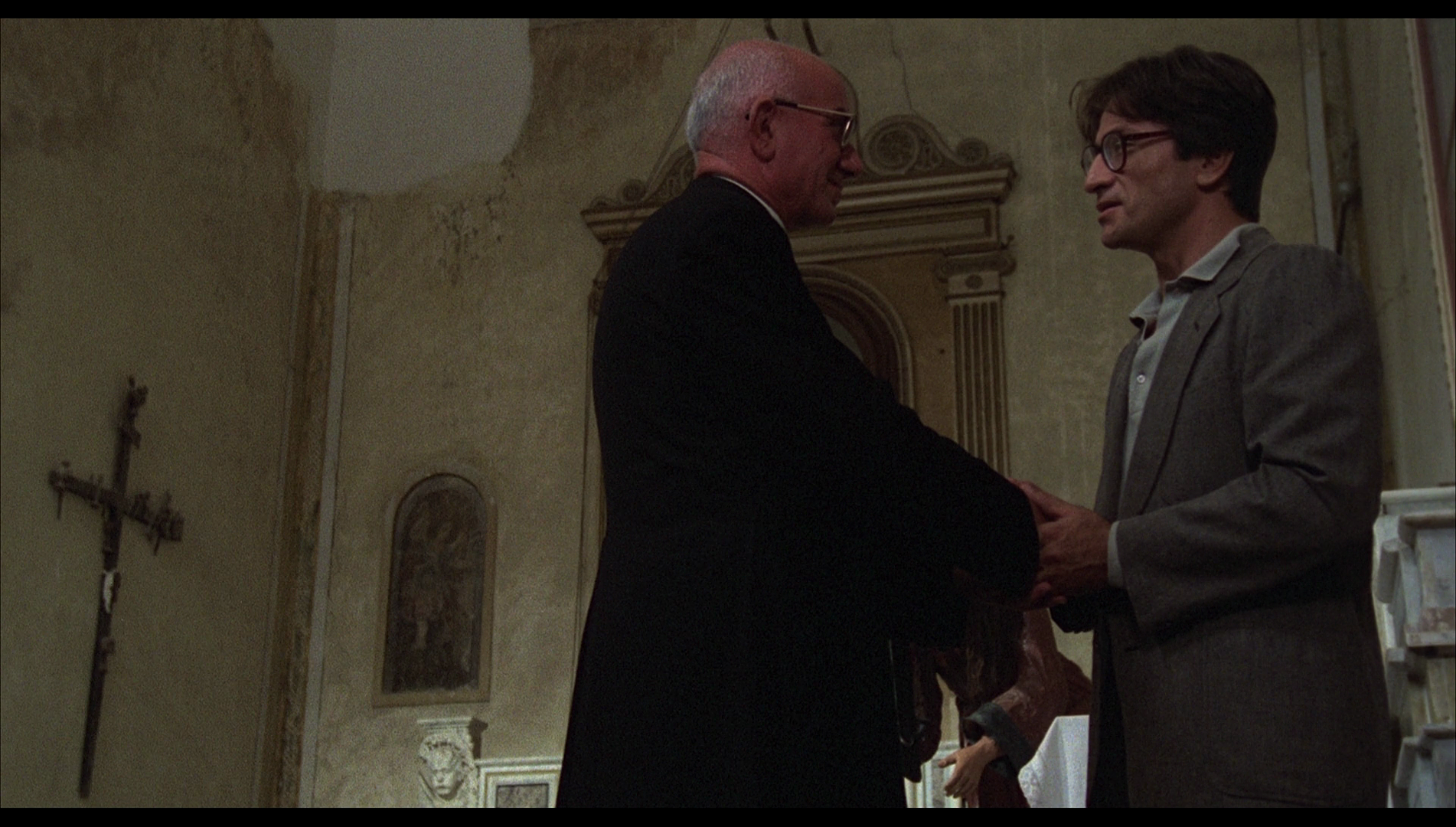 Given its subject matter, it’s amazing that Three Brothers avoids being either didactic or cloyingly sentimental. Like pretty much all of Rosi’s films, Three Brothers is an impressive, thought-provoking film – though very different from the semidocumentary pictures that Rosi became associated with from Salvatore Giuliano to Illustrious Corpses. In its exploration of issues surrounding the radicalisation of youth and how society might deal with this issue, Three Brothers feels both very much ‘of its time’ (the era at the end of the anni di piombo) and utterly relevant to today. Perhaps surprisingly, given Rosi’s reputation, Three Brothers hasn’t been released on home video in the UK until now; thankfully, Arrow’s release corrects that oversight in a spectacular fashion. Given its subject matter, it’s amazing that Three Brothers avoids being either didactic or cloyingly sentimental. Like pretty much all of Rosi’s films, Three Brothers is an impressive, thought-provoking film – though very different from the semidocumentary pictures that Rosi became associated with from Salvatore Giuliano to Illustrious Corpses. In its exploration of issues surrounding the radicalisation of youth and how society might deal with this issue, Three Brothers feels both very much ‘of its time’ (the era at the end of the anni di piombo) and utterly relevant to today. Perhaps surprisingly, given Rosi’s reputation, Three Brothers hasn’t been released on home video in the UK until now; thankfully, Arrow’s release corrects that oversight in a spectacular fashion.
Arrow’s new Blu-ray release of Three Brothers is deeply impressive, containing an excellent presentation of the main feature and some very strong contextual material. The booklet in this release is almost worth the price of admission on its own. This is a very, very good film that has been given a deeply pleasing release, and it comes with a very strong recommendation. References: Bondanella, Peter, 2009: A History of Italian Cinema. London: Continuum International Publishing Nochimson, Martha P, 2010: World on Film: An Introduction. London: Wiley-Blackwell Sorlin, Pierre, 1996: Italian National Cinema, 1896-1996. London: Routledge 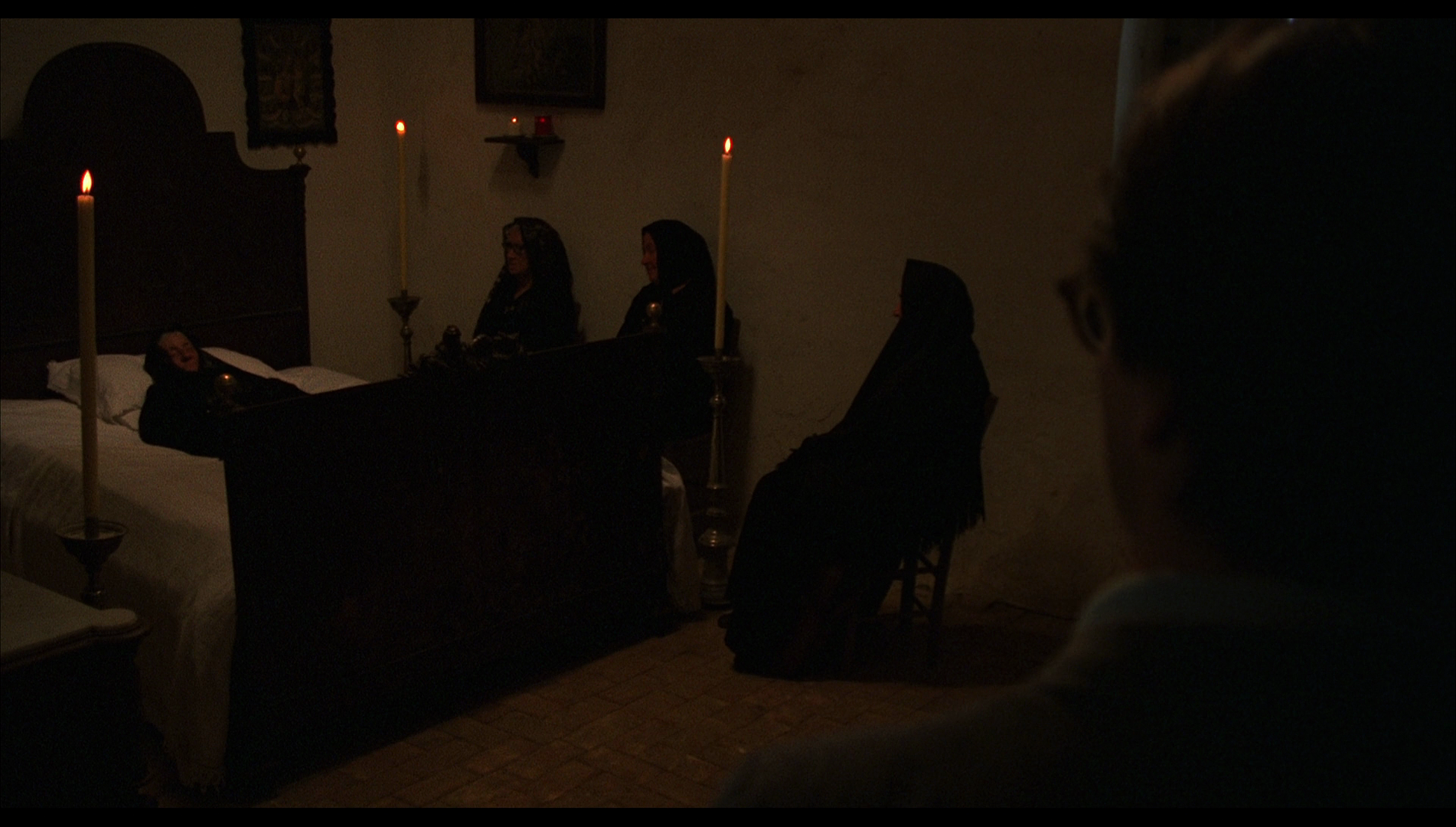
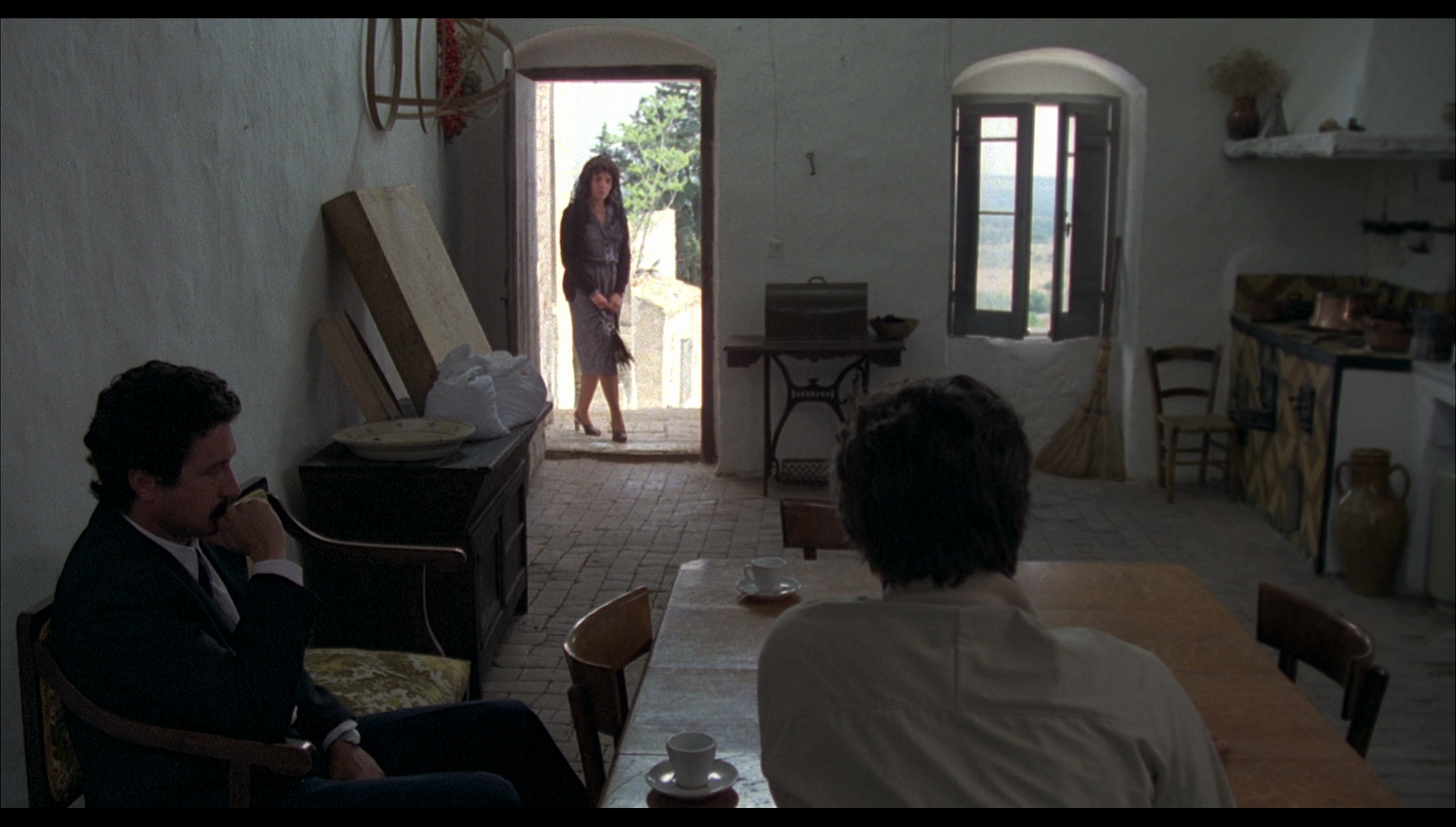
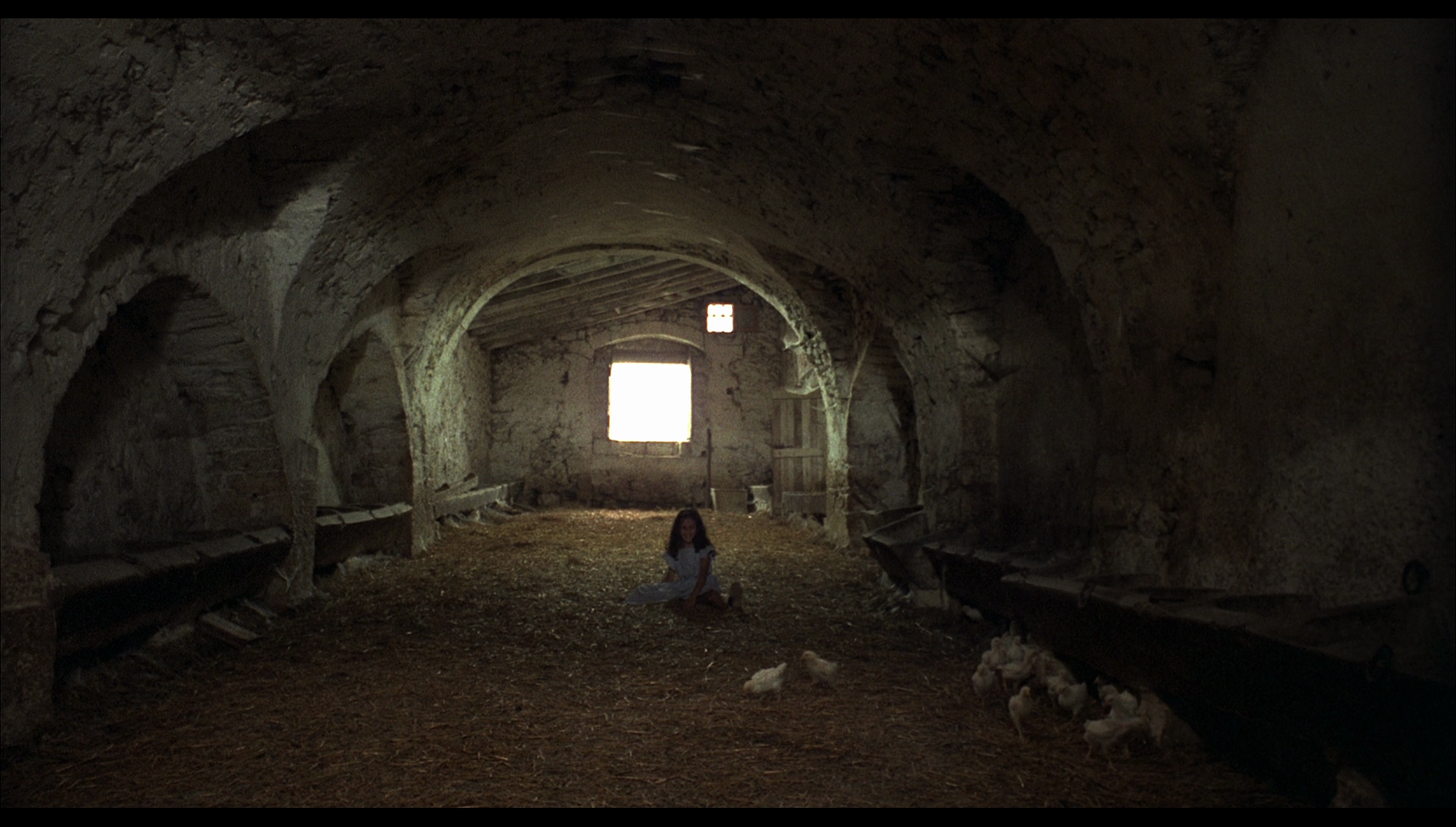
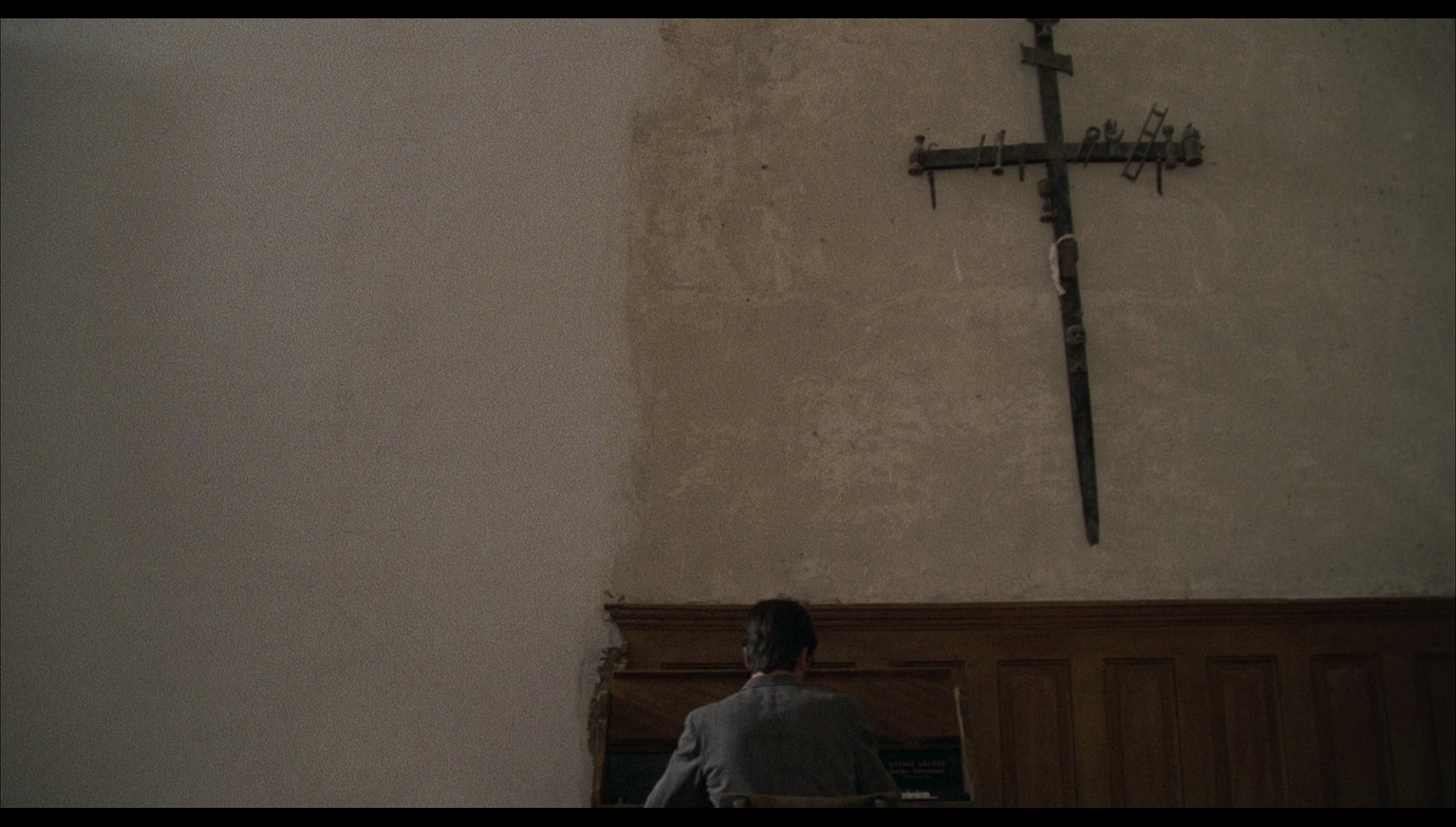
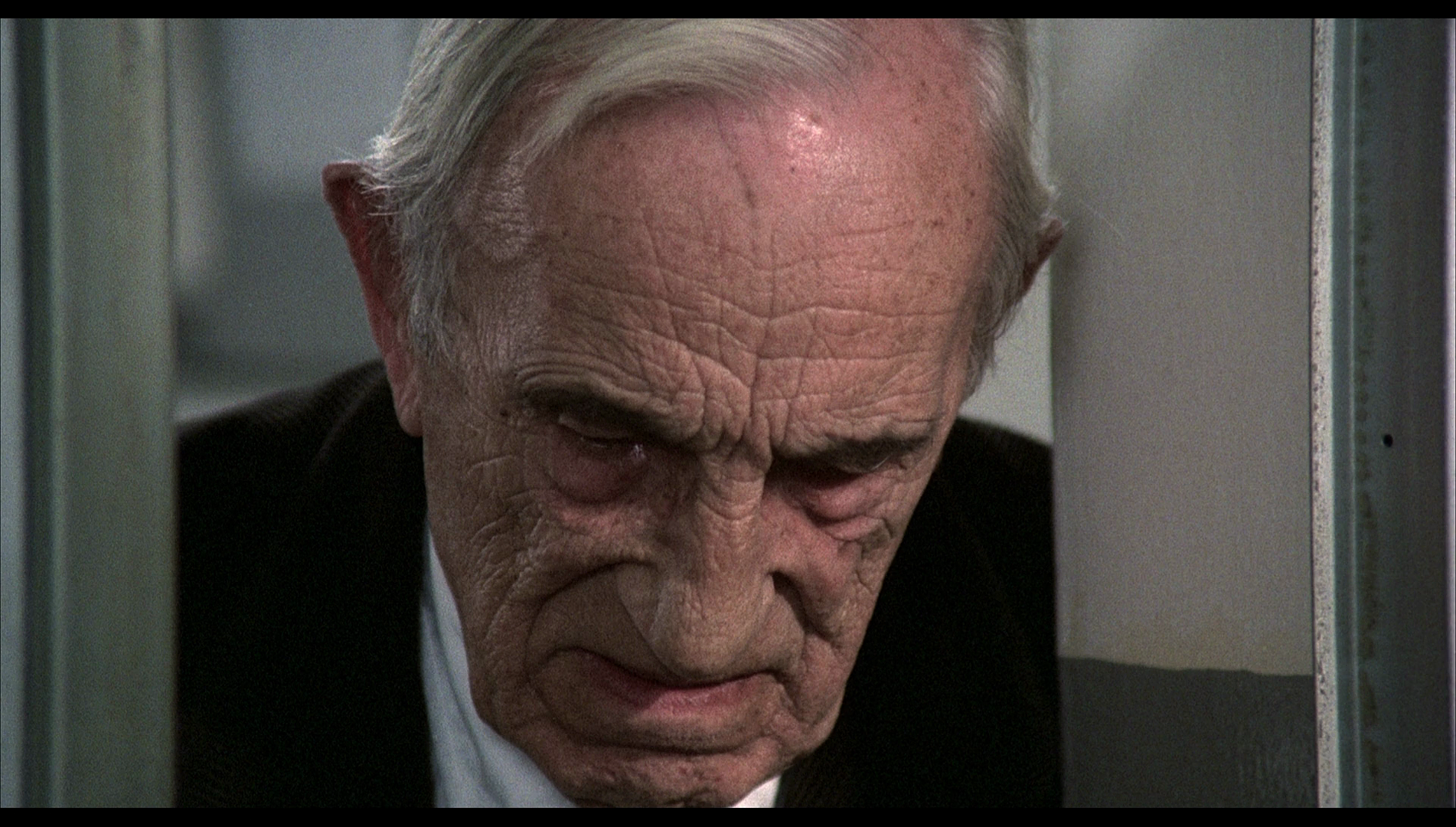
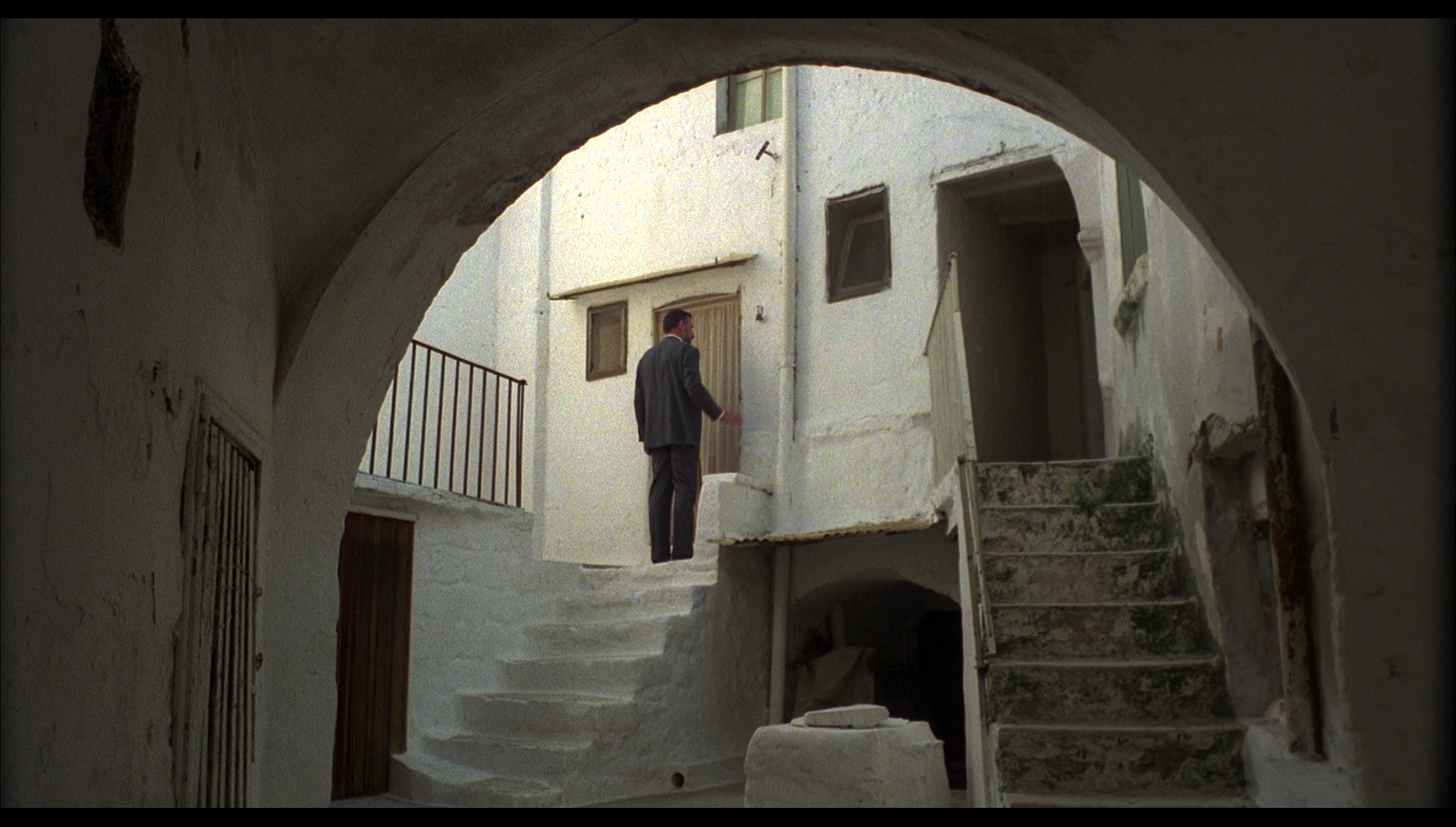
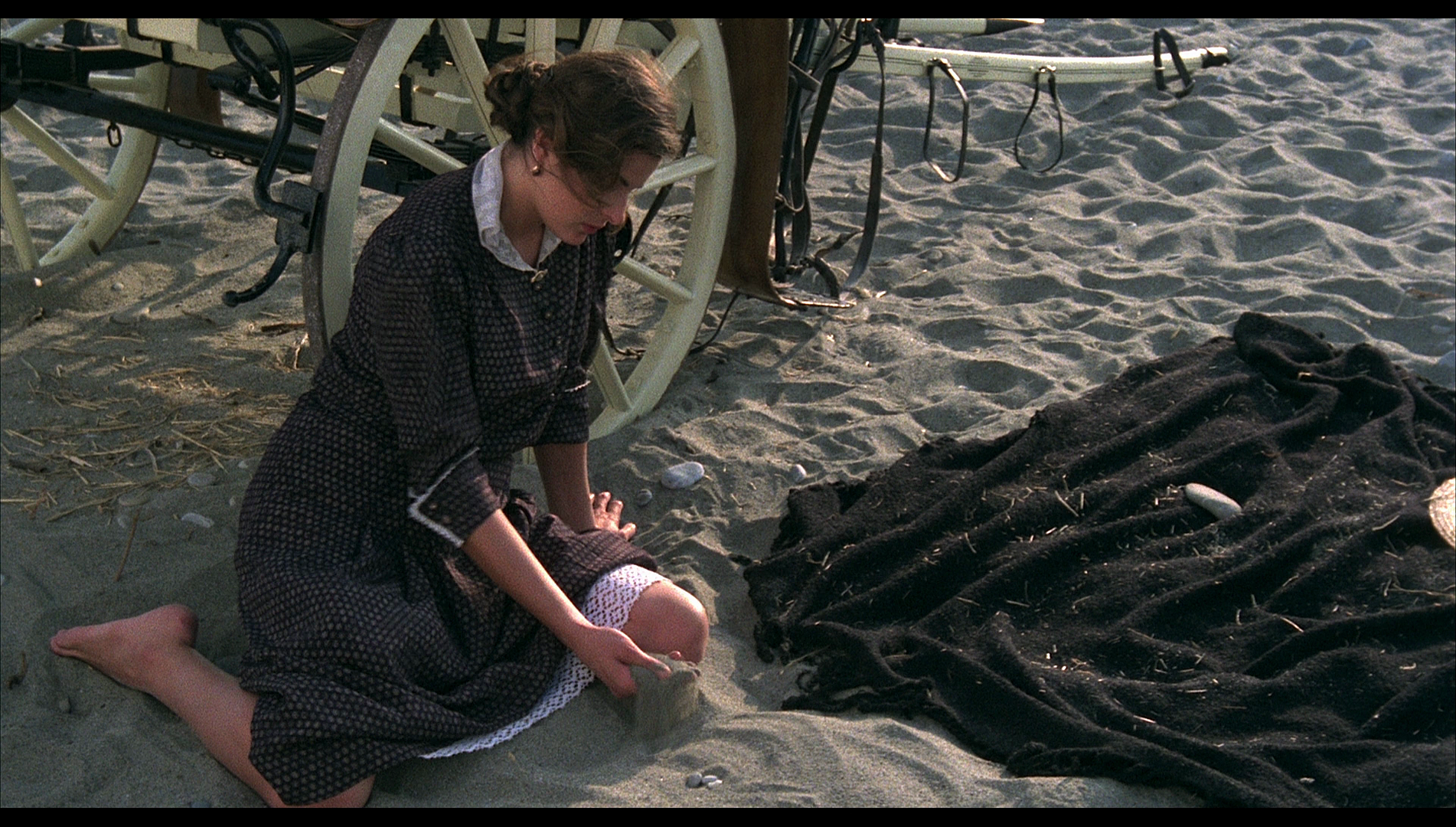
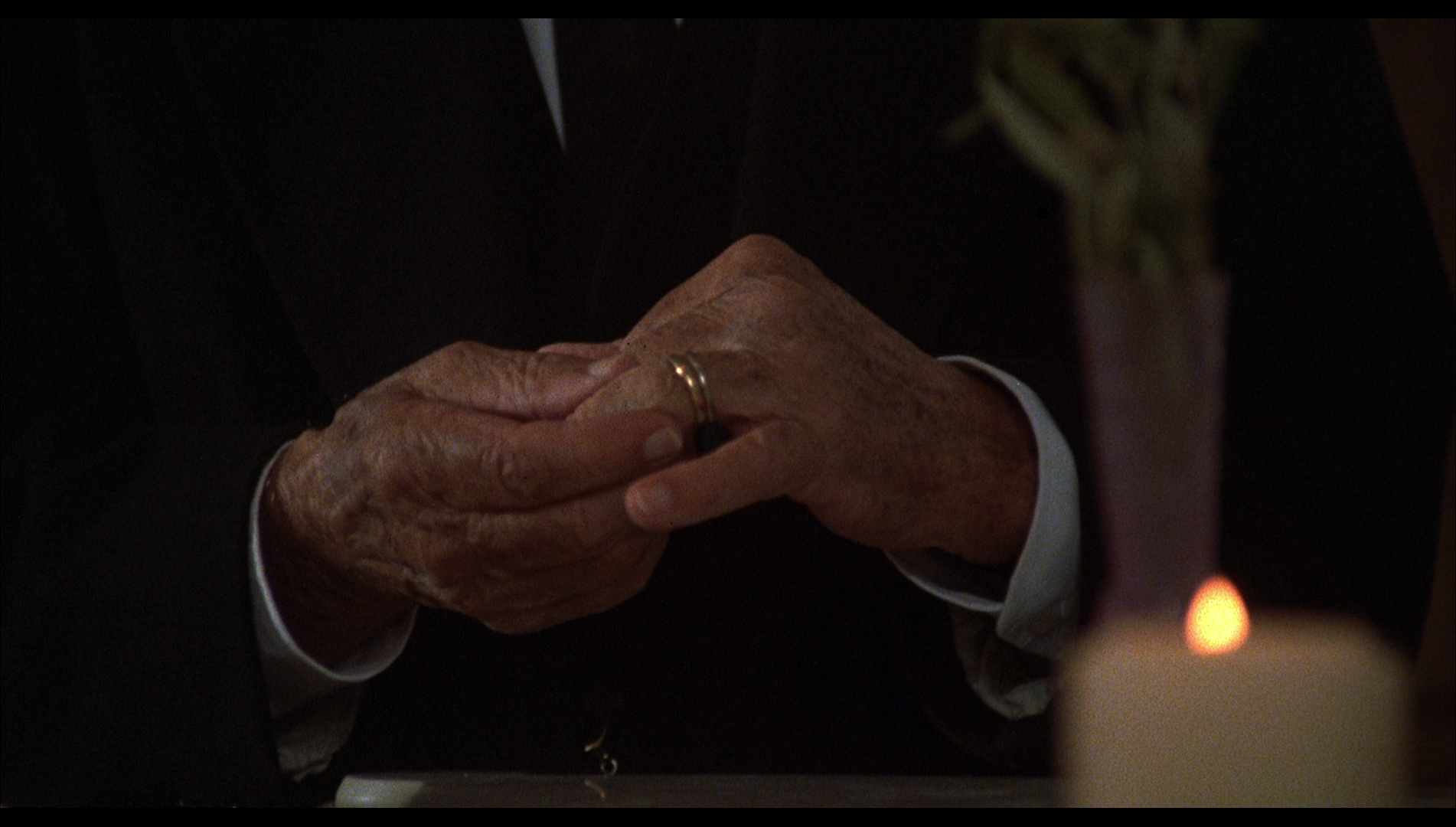
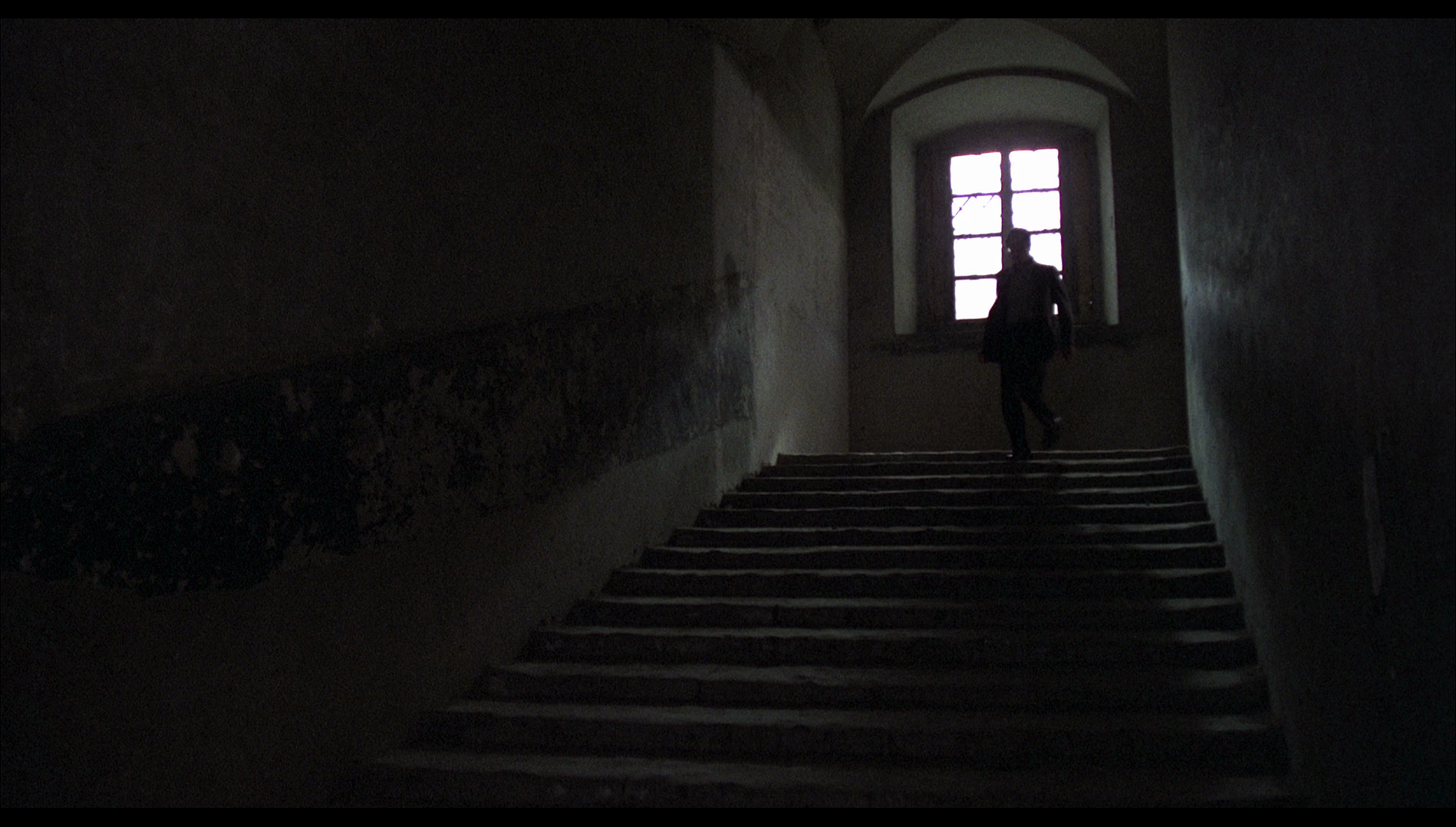
|
|||||

|